


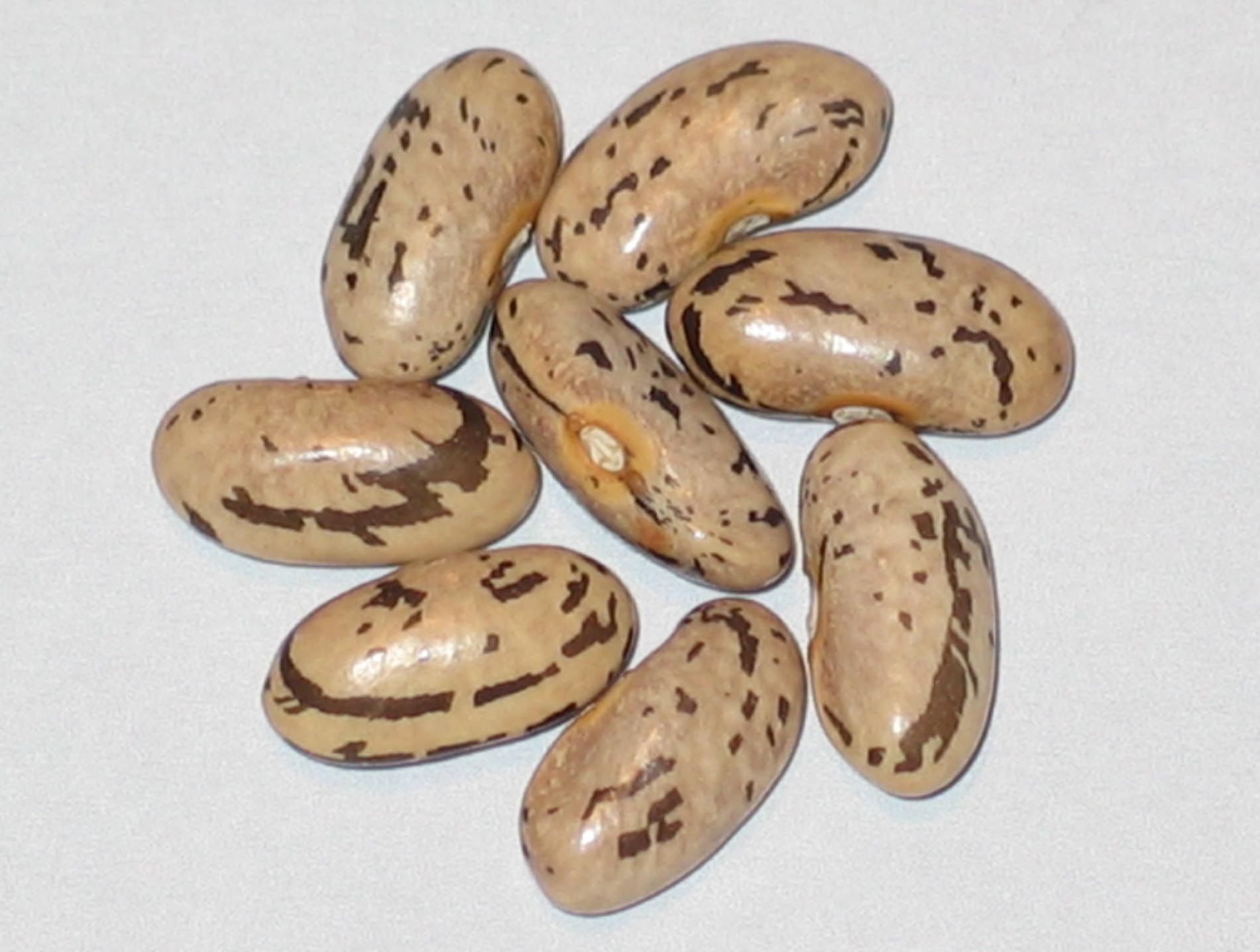
Louisiana
Packet Size 25 Seeds $5.00
Pole Snap. With a maturity of 75 days for fresh snaps and 100 days for the first dry seeds, this variety offers bountiful yields of vibrant green pods adorned with striking purple streaks. Each pod typically contains 8 to 9 seeds and retains its tenderness over an extended period, making it a standout choice for gardeners. This is undoubtedly one of my all-time favorite pole snap varieties, and feedback from those who have grown it echoes that sentiment, highlighting the enjoyment and success theyíve experienced with this remarkable bean.
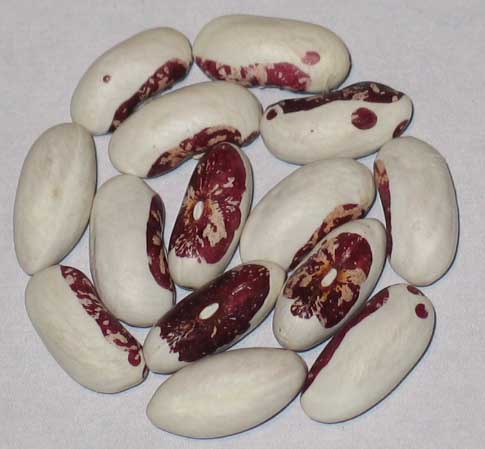
Lynnfield
Packet Size 15 Seeds $3.00
Taking over 110 days to mature, this remarkable bean produces seeds that are notably larger than kidney beans. It was discovered in the early 1980s by renowned bean collector John Withee of Wanigan Associates, while he was cultivating a variety known as Lila Stuart. Lila Stuart itself has an intriguing history, hailing from the esteemed efforts of the late Ernest B. Dana, a dedicated gardener from Etna, New Hampshire.
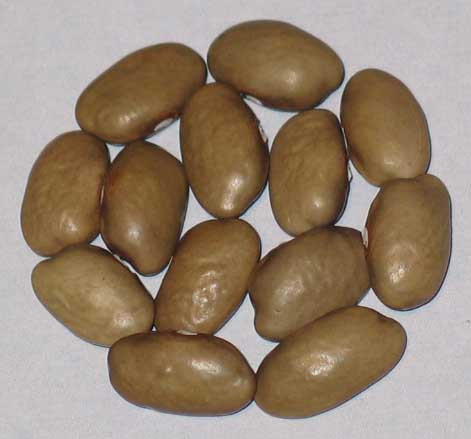
Ma Willimas
Packet Size 25 Seeds
Pole Snap. This highly productive variety takes 90 to 110 days to mature for dry seeds and is celebrated for its versatility, being suitable for both fresh consumption and as a dry bean. The large pods of Ma Williams transform into a vibrant bright pink as the seeds mature, adding visual appeal to the garden. With its rich Appalachian heritage, this bean is a favorite among growers for its dual purpose and abundant yields.
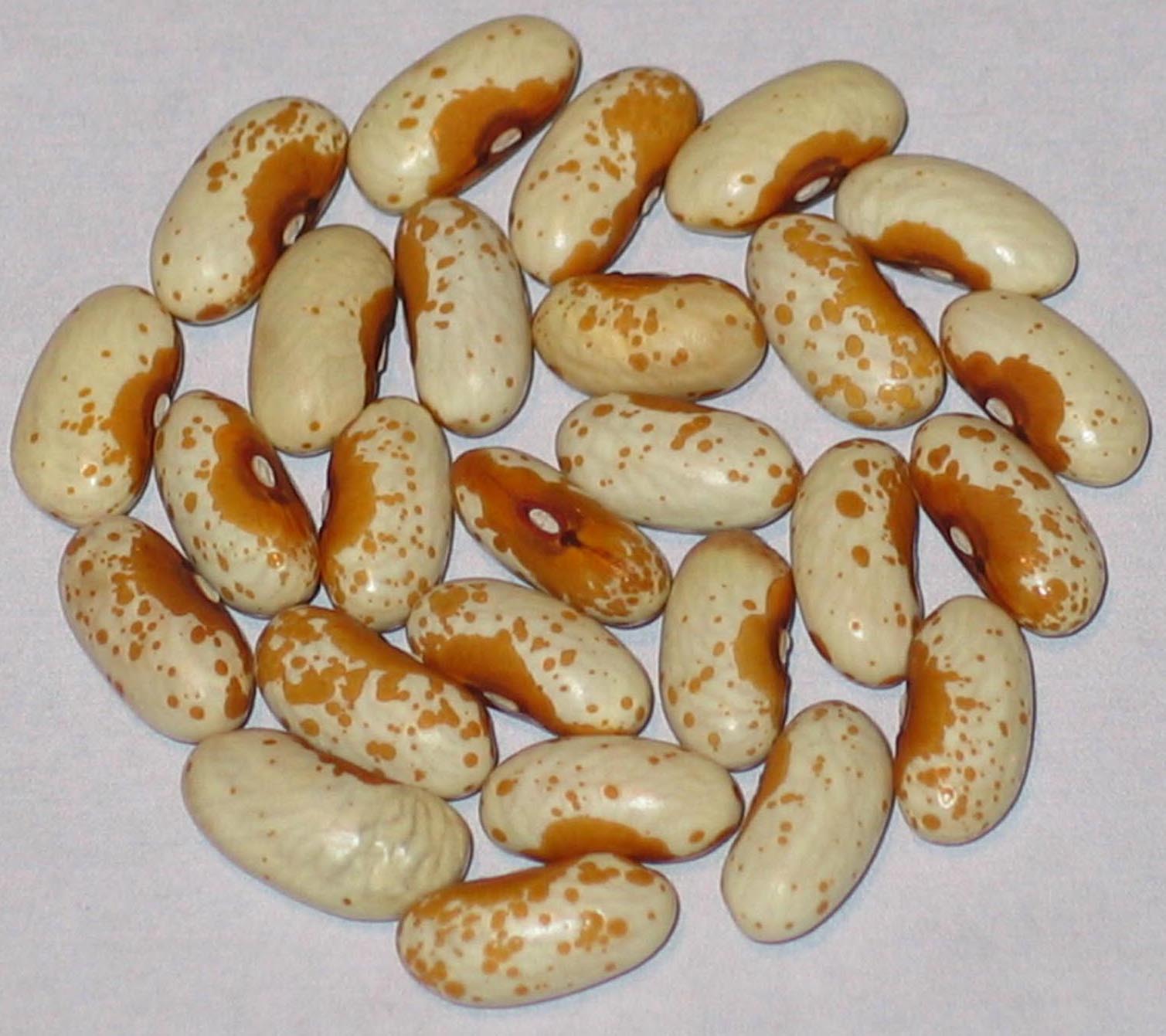
Madelia
Packet Size 25 Seeds
Bush Snap. This variety reaches maturity in 76 days, this robust plant yields an impressive harvest of 5-6 inch round green pods. Developed by Robert Lobitz, Madelia was introduced through the Seed Savers Exchange yearbook in 2004. The seeds closely resemble those of another Lobitz creation, Alice Sunshine, but are distinguished by their larger size, along with the larger plants and pods.
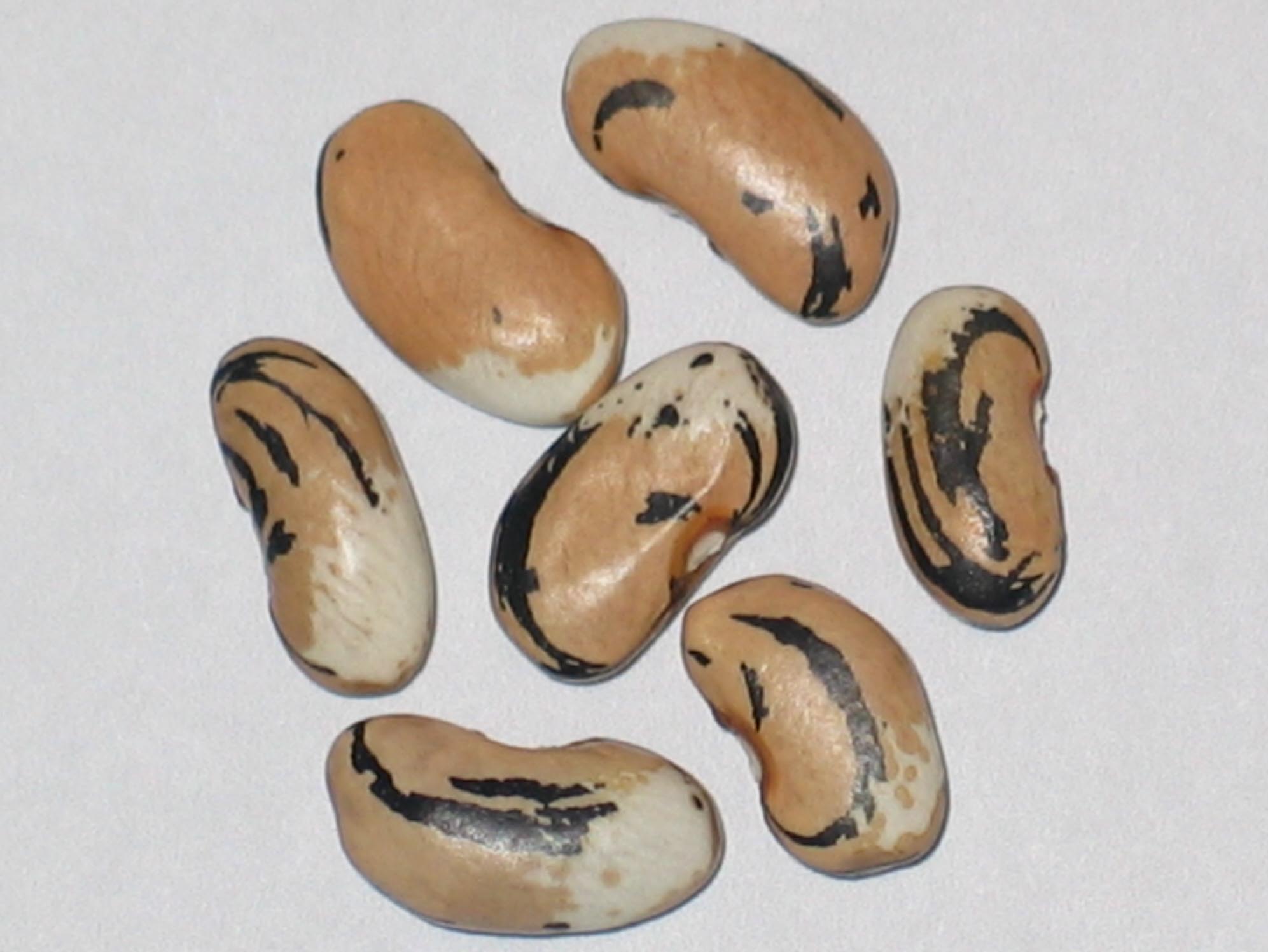
Maggies Cresent
Packet Size 25 Seeds $5.00
This bush snap variety boasts striking white blossoms and takes over 90 days to produce dry seeds. Known for its high yield, each 5-inch pod typically contains 4 to 5 seeds. Believed to be a cross between the Magpie another unknown bean. Maggie's Crescent is another variety introduced by Robert Lobitz.
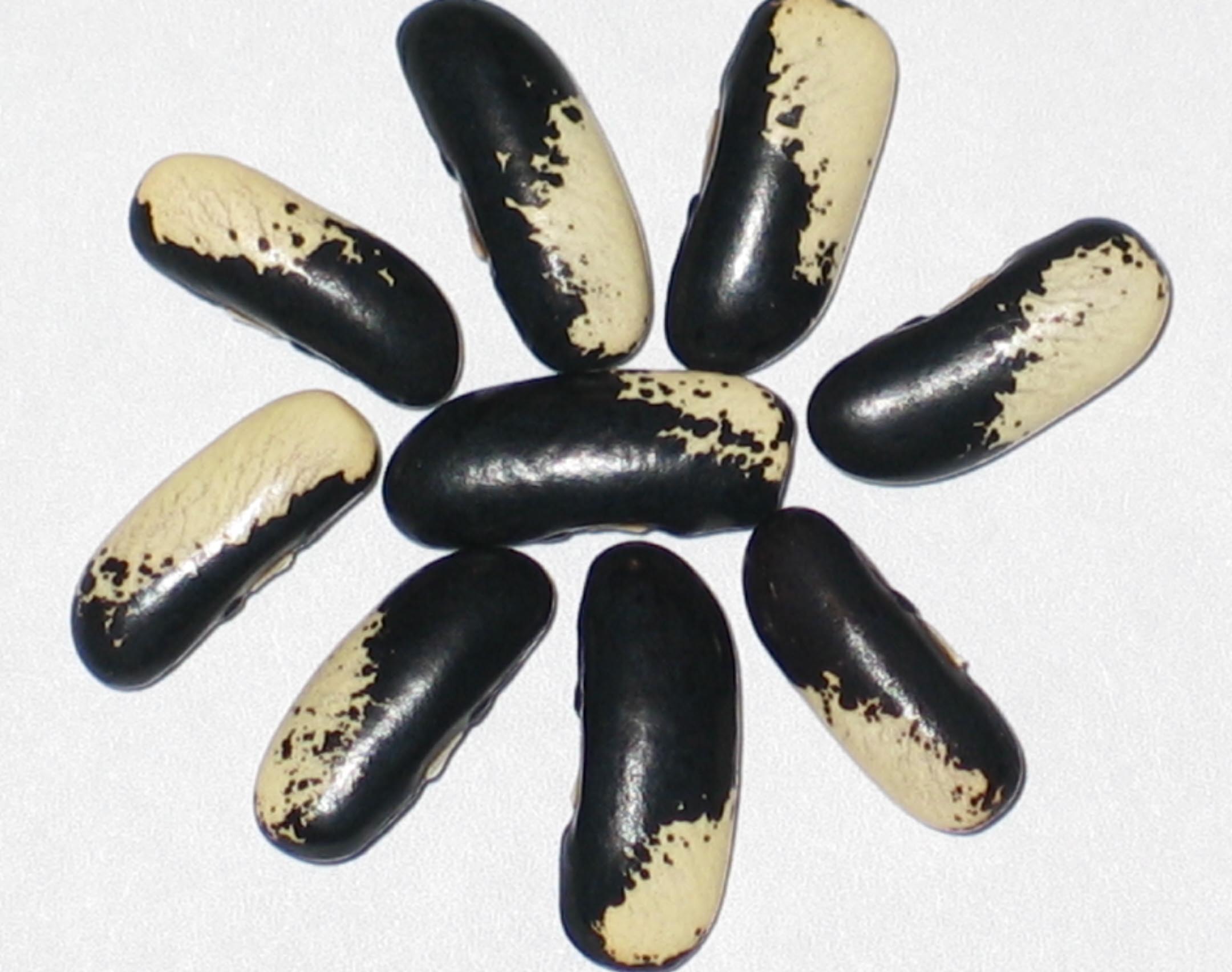
Magpie
Packet Size 30 Seeds $5.00
This bush snap bean matures in over 50 days for snap usage and around 90 days for dry seeds. Best for snaps when picked young. The plants have a robust, erect growth habit, reaching 15 to 18 inches in height without runners. Magpie features long, smooth pods measuring 5.25 x 5/16 inches, resembling those of the Painted Pony and Vermont Appaloosa varieties. Initially introduced as Superlative by Sutton of England in 1909, Magpie was brought from France in 1913, with both varieties later determined to be identical.

Maine
Packet Size 25 Seeds $5.00
This bush dry bean variety takes nearly 90 days to produce dry seeds and is part of the yellow eye bean group, which includes Maine Yellow Eye, Vermont Yellow Eye, and Molasses Face. Added to the collection in 2014, Maine was sourced from Mandy's Greenhouse in Tyndall, Manitoba, Canada, contributing to the rich diversity of yellow eye beans.
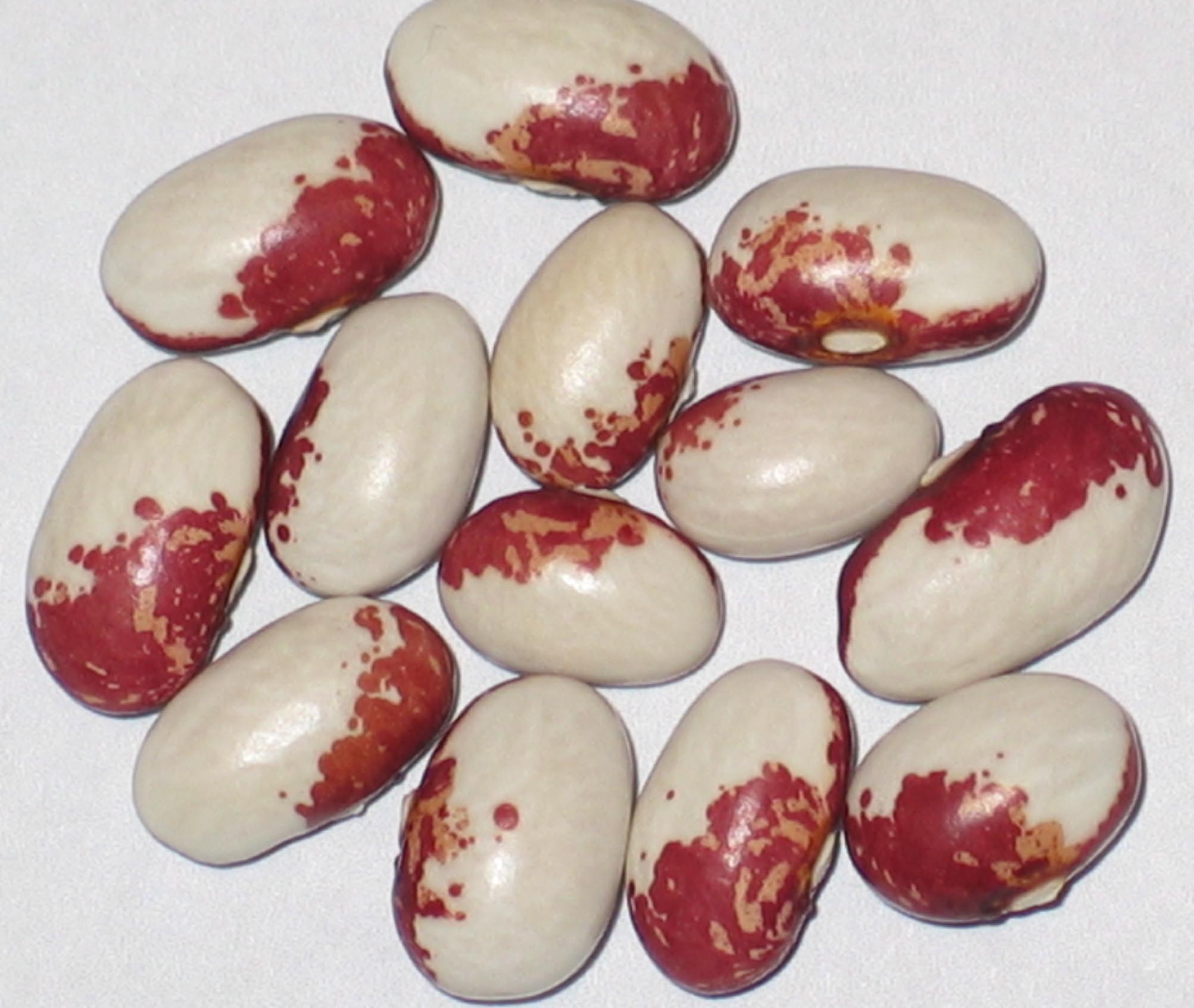
Maine Sunset
Packet Size 25 Seeds $5.00
This bush dry bean matures in nearly 90 days and is characterized by its beautiful, rounded, plump seeds featuring a large red figure surrounding the eye, complemented by a hint of buff mottling. Evoking the essence of a Maine heirloom, Maine Sunset closely resembles the Rockwell variety, making it a delightful addition for bean enthusiasts.
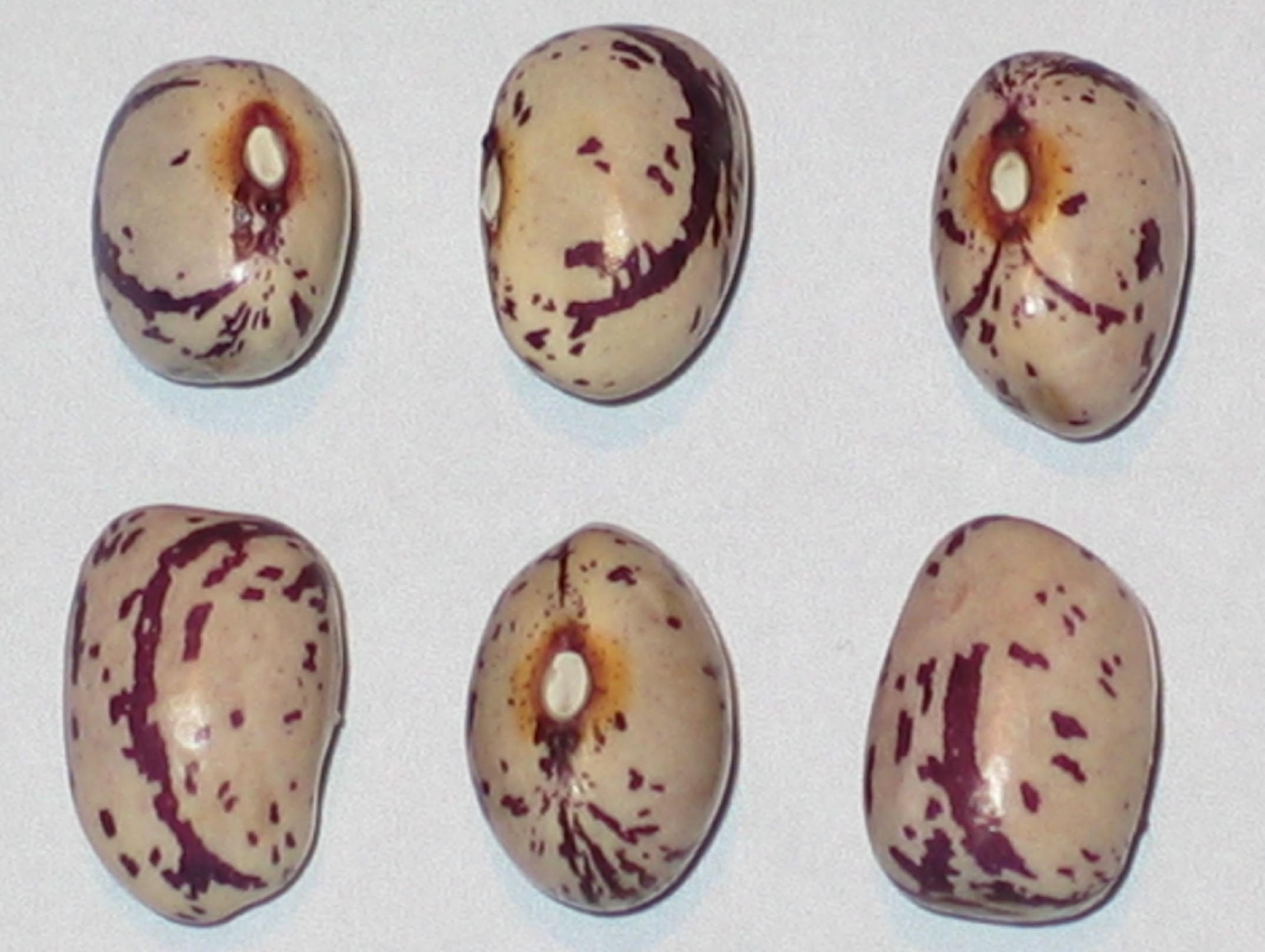
Major Cook's
Packet Size 20 Seeds $5.00
Pole. Productive plants climb over 8'. 5.5" pods splashed bright red turn deep purple as pods become curved before drying. Multi purpose. Pods are fiberless, thick walled and juicy with a strong flavor. Sweet rich and pleasant. If you eat the whole beans they will stay intact in a casserole. The texture is buttery, silky, rich and sweet. British citizen Harold Luxton was in France during WW1. He returned to work as a gardener for the War Graves Commission under a Major Cook. Breeding a bean to their liking. Luxton was awarded a British Empire medal from the Royal Horticultural Society for his work.
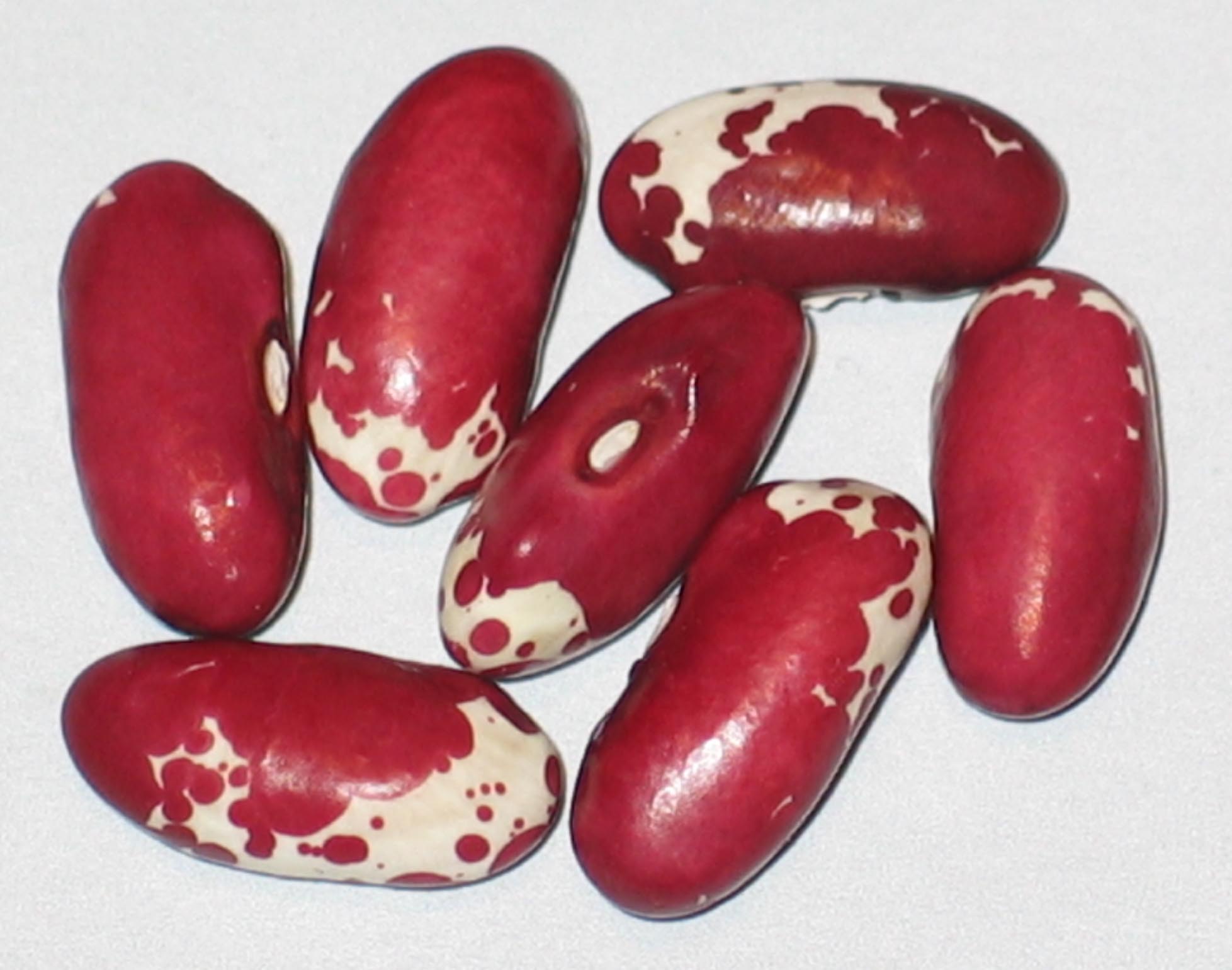
Mammoth Trout
Packet Size 25 Seeds $5.00
This bush dry bean variety thrives without runners, demonstrating productivity in a northern Illinois summer. While the plants may appear similar to other bean varieties, they were a part of John Withee's Wanigan collection, having been donated by the late SSE member Ernest B. Dana from Etna, N.H. The Mammonth Trout is valued for its resilience and consistent yield, making it a noteworthy addition for growers in cooler climates.
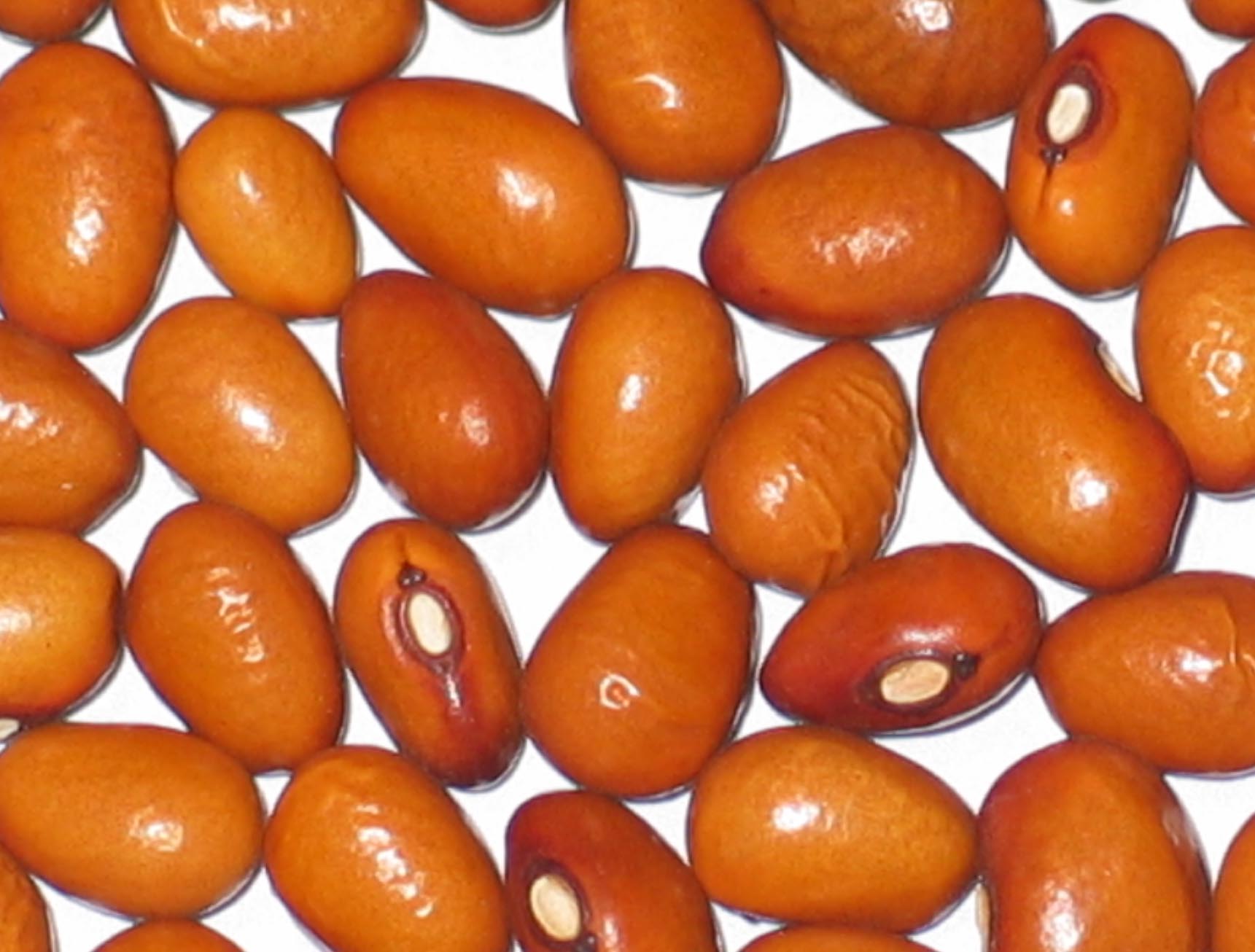
Marfax
Packet Size 30 Seeds $5.00
This bush dry bean variety features rounded golden-tan beans that are larger than Navy beans and share a similar hue to Beka Brown beans. A beloved choice in New England, Marfax's origins are somewhat obscure, with some accounts suggesting it was introduced to "Downeast" Maine by the federal government during the Great Depression. Known for its classic baking and hearty soup applications, Marfax beans boast a toothsome texture that holds their shape beautifully even during long, slow cooking.
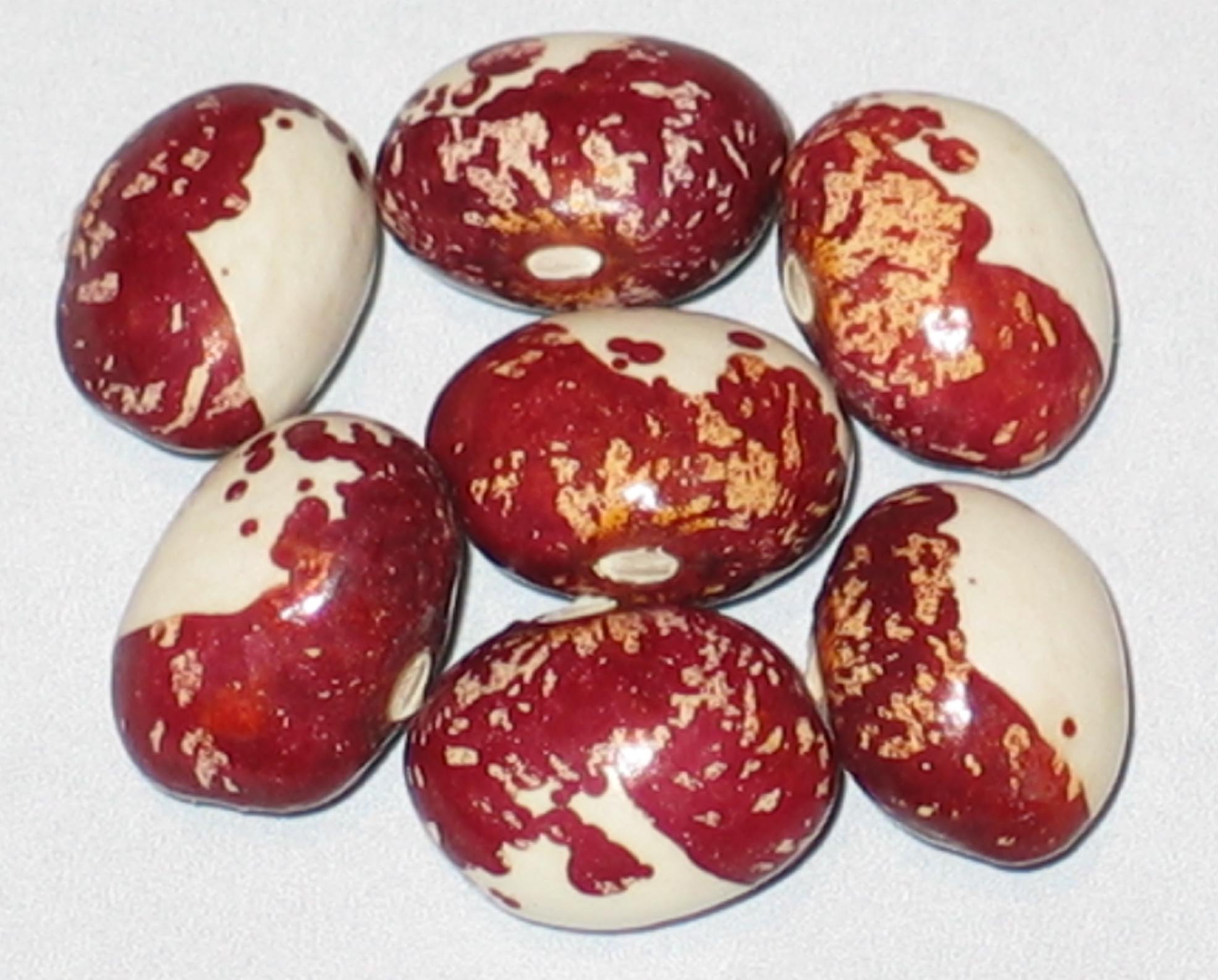
Mariazeller
Packet Size 20 Seeds $5.00
This pole dry bean variety takes 115 days to yield its first dry pods and is known for its vigorous climbing ability, producing round green pods measuring 4 x Ĺ inches that develop wrinkles as they dry. Originating from a grower in Leibenfels, Austria, Mariazeller's name pays homage to the Mariazell Basilica, a significant pilgrimage site and one of Europe's most frequented shrines. The beans themselves are strikingly beautiful, featuring large, round seeds adorned in a mix of white and red, enhanced by golden caramel flecks over the red, making them not only a delightful addition to any garden but also a visually appealing culinary choice.
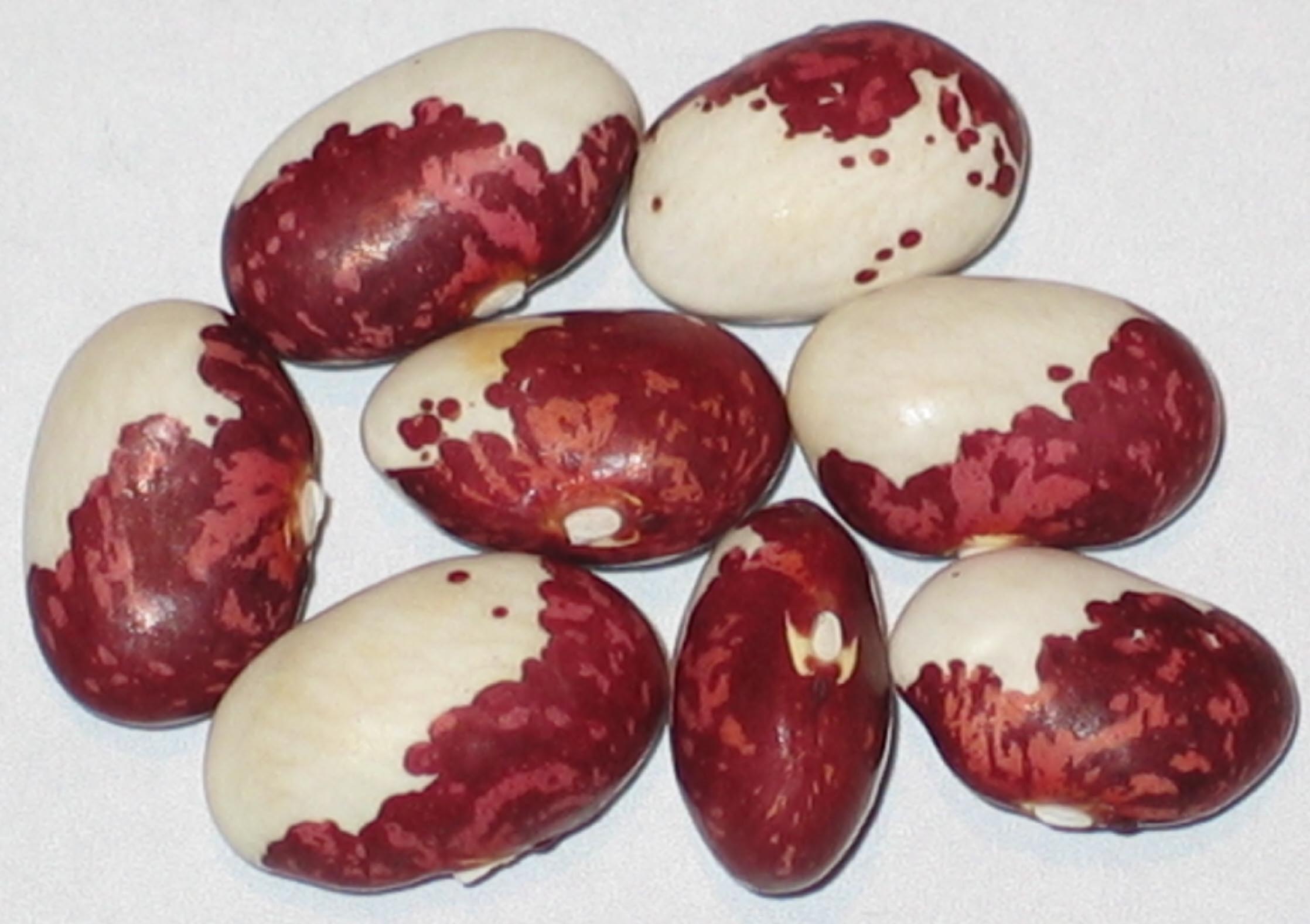
Maria Zeller
Packet Size 25 Seeds $5.00
Bush Dry. 85 days. Produces robust green pods 4.75 to 5.5 inches with impressive high yields. The seed was acquired in early 2012 from a young woman named Andrea Jones in the U.K., who was struggling to maintain the variety. I was fortunate to receive her last two seeds, which I cultivated to over 1,200. It was rewarding to preserve her bean, and she expressed her gratitude with a sample of the seeds I sent her after two growing seasons. Although the bean's history remains somewhat obscure, it has been sold at a market in Graz, Austria, since 1990. Graz, is the capital of the federal state of Styria, and may hold the key to this beautiful beanís origins.
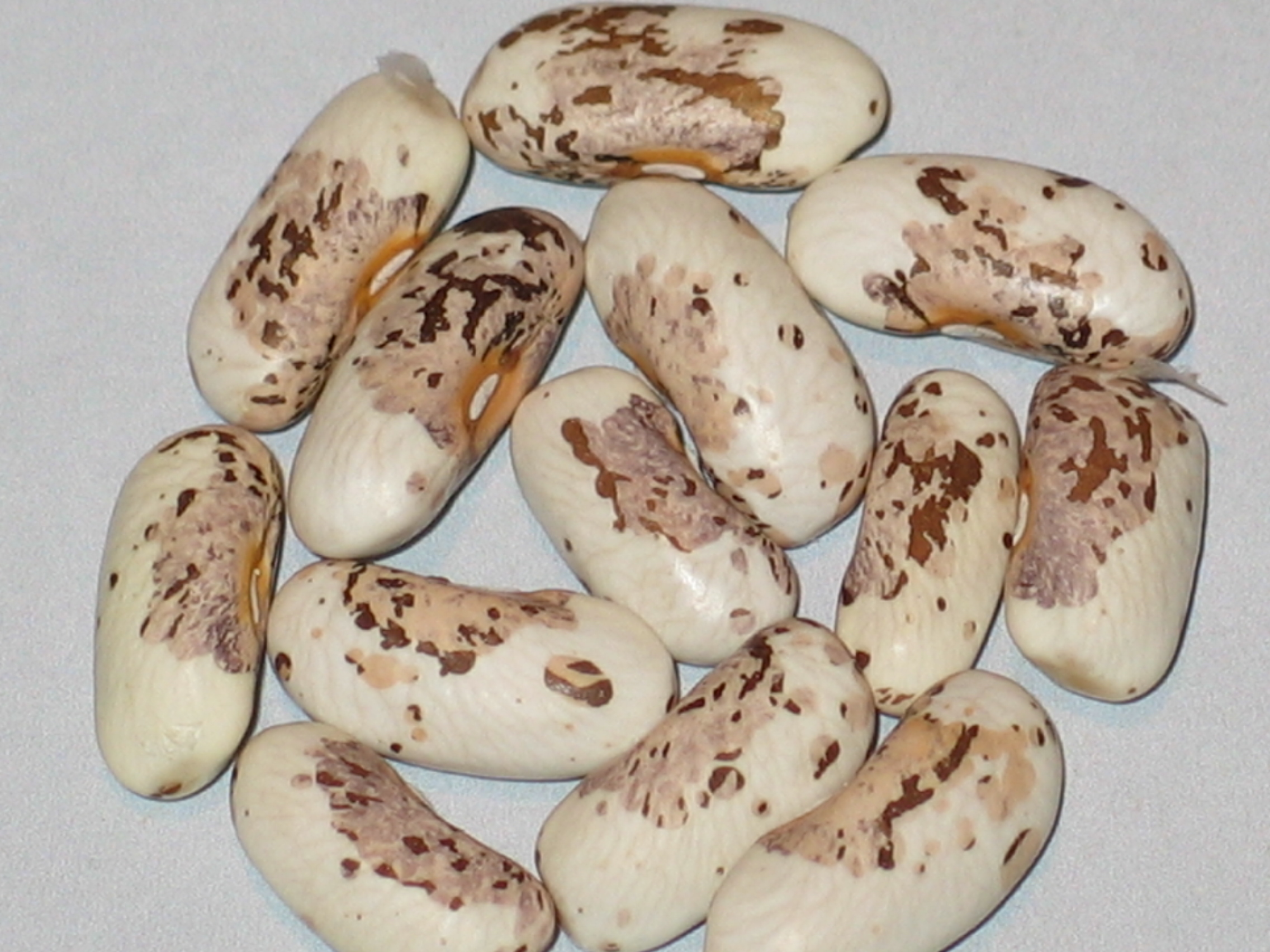
Mazeppa
Packet Size 20 Seeds $5.00
Mazeppa is a bush dry bean variety that produces its first dry pods in approximately 82 days. Developed and introduced by Robert Lobitz, this bean is characterized by seed coats that exhibit similar coloration and patterning to another of Lobitz's creations, the Canoe bean. Notably, the brownish area surrounding the eye of Mazeppa suggests a potential Pinto influence in its breeding. The plants are compact, reaching heights of about 15 inches without the need for runners, making them an ideal choice for gardeners seeking productivity in limited spaces.

Mbombo Green
Packet Size 25 Seeds $5.00
Mbombo Green bean is a pole, dry and snap variety known for its striking green seeds, which can be utilized in soups and enjoyed as a fresh green vegetable. Originating from Kenya, this bean holds cultural significance among the Kuba tribe, where it is associated with the Creator God and symbolizes prosperity and fertility for the soil. Its unique attributes and cultural relevance make it a valuable addition to both culinary practices and agricultural traditions within the region.
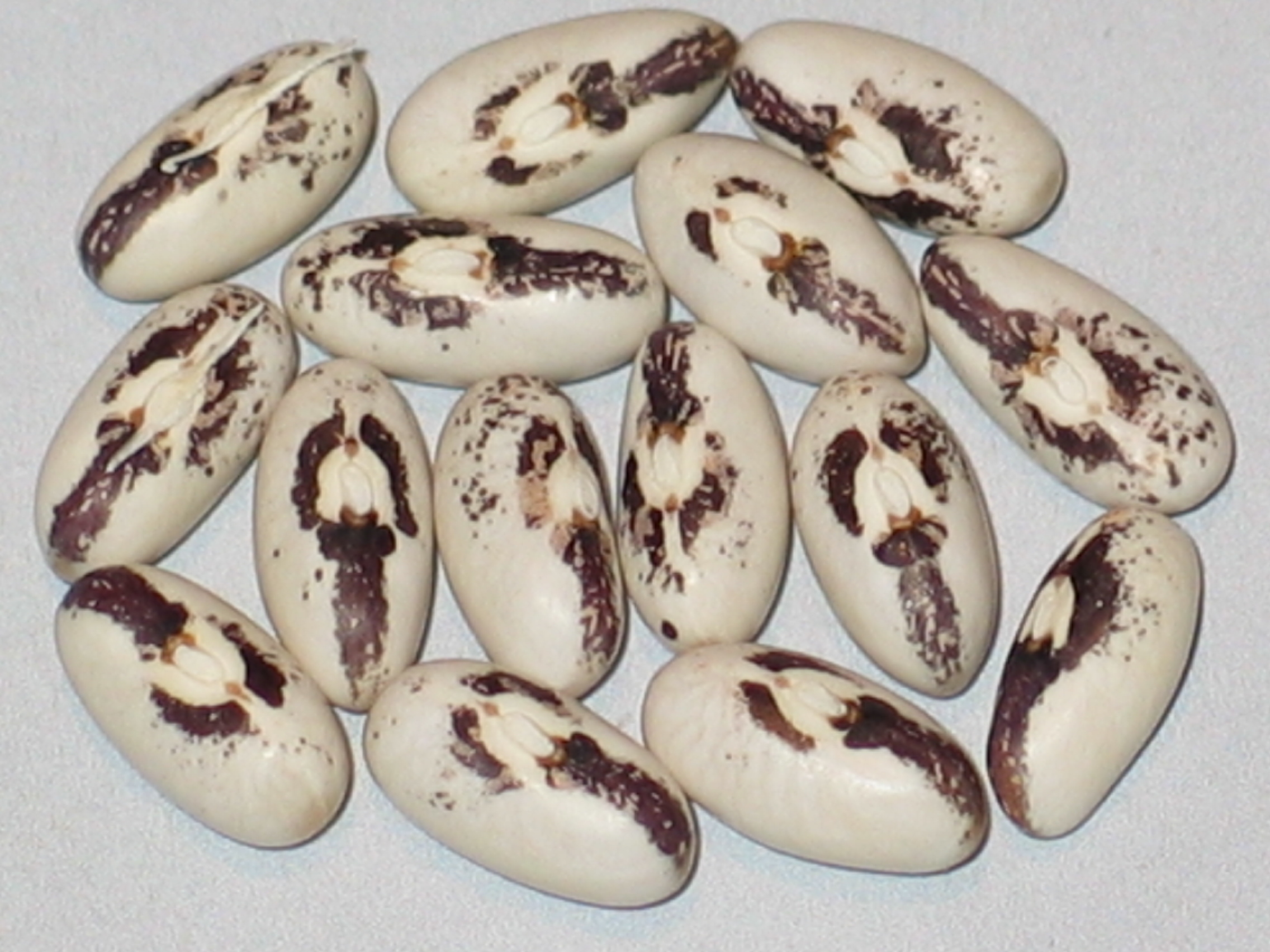
Medal Refugee
SOLD OUT
Medal Refugee is a bush snap bean variety developed and introduced by the Asgrow Seed Company in New Haven, Connecticut, in 1942. Celebrated as one of the exemplary snap beans from the World War II era, it features excellent round green pods known for their quality and flavor. The bean's parentage includes a cross between United States 5 and Round Pod Kidney Wax varieties, contributing to its robust characteristics and enduring popularity among gardeners.
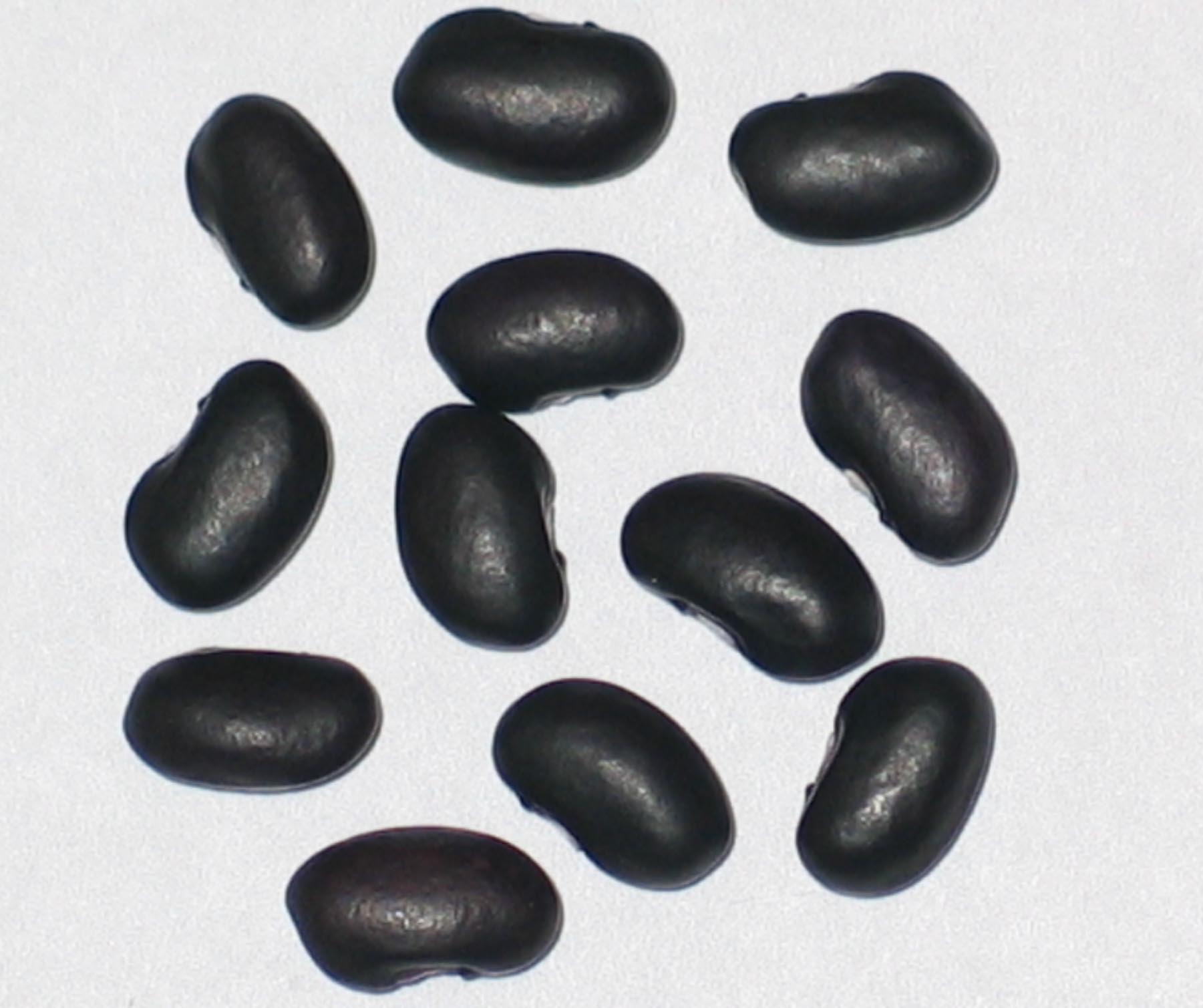
Midnight Black Turtle Soup
Packet Size 50 Seeds $5.00
Midnight Black Turtle Soup bean is a semi-runner dry variety that takes approximately 90 days to yield its first dry pods, showcasing beautiful violet blossoms. Notably, it is among the most productive beans in both bush and semi-runner categories, consistently generating a significant volume of beans by total weight. Developed at Cornell University, this variety is particularly prized for its pleasant flavor, making it an excellent choice for black bean soup while producing large quantities of pods near the end the growing season.
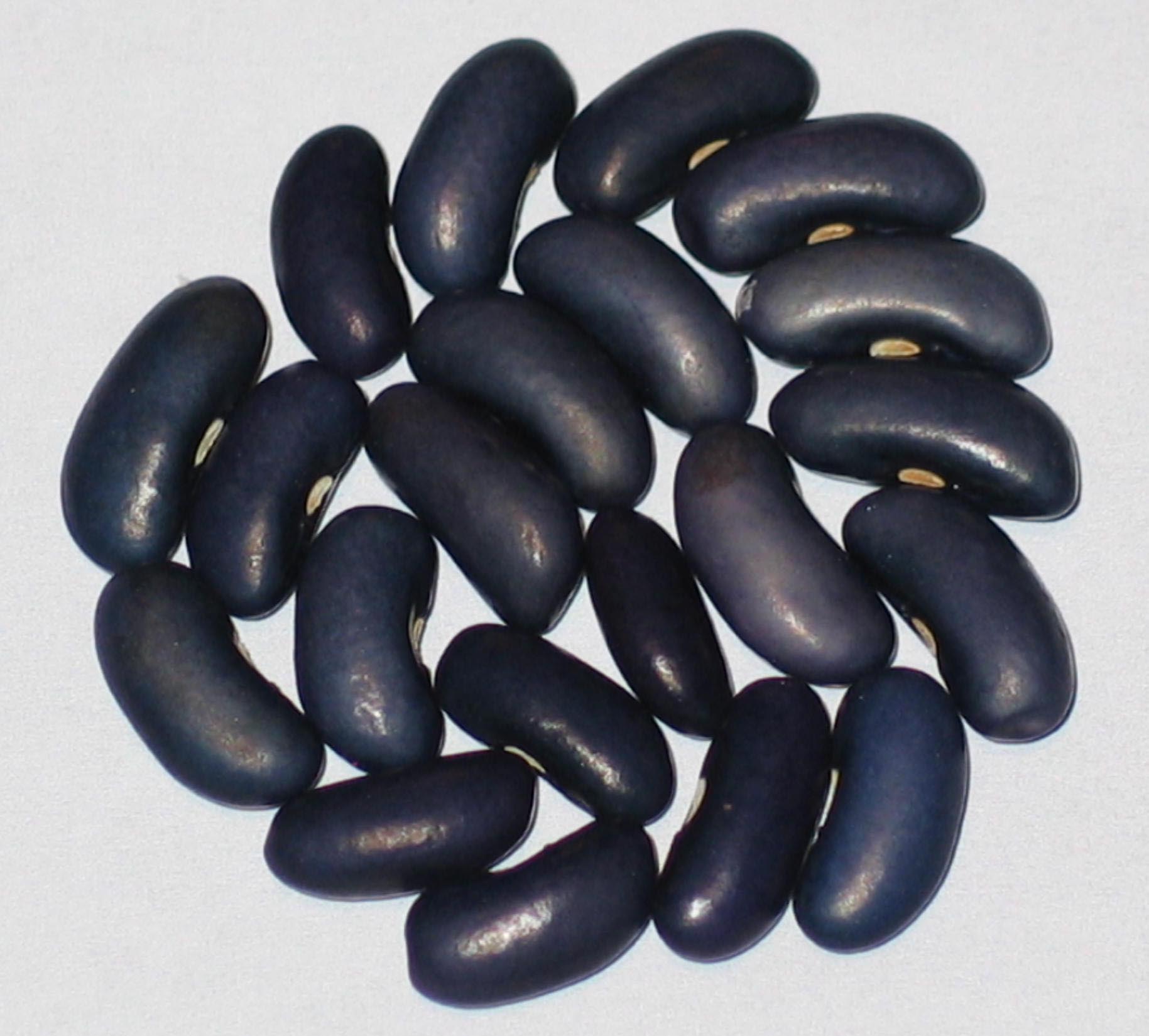
Midnight Blue
Packet Size 25 Seeds $5.00
Midnight Blue is a semi-runner dry bean variety that matures in about 85 days, producing striking pink blossoms and beautiful 5.5-inch purple pods. Introduced by Robert Lobitz through the Seed Savers Exchange yearbook in 2001, it is known for unique coloration, making it both a visually appealing and fruitful addition to any garden.
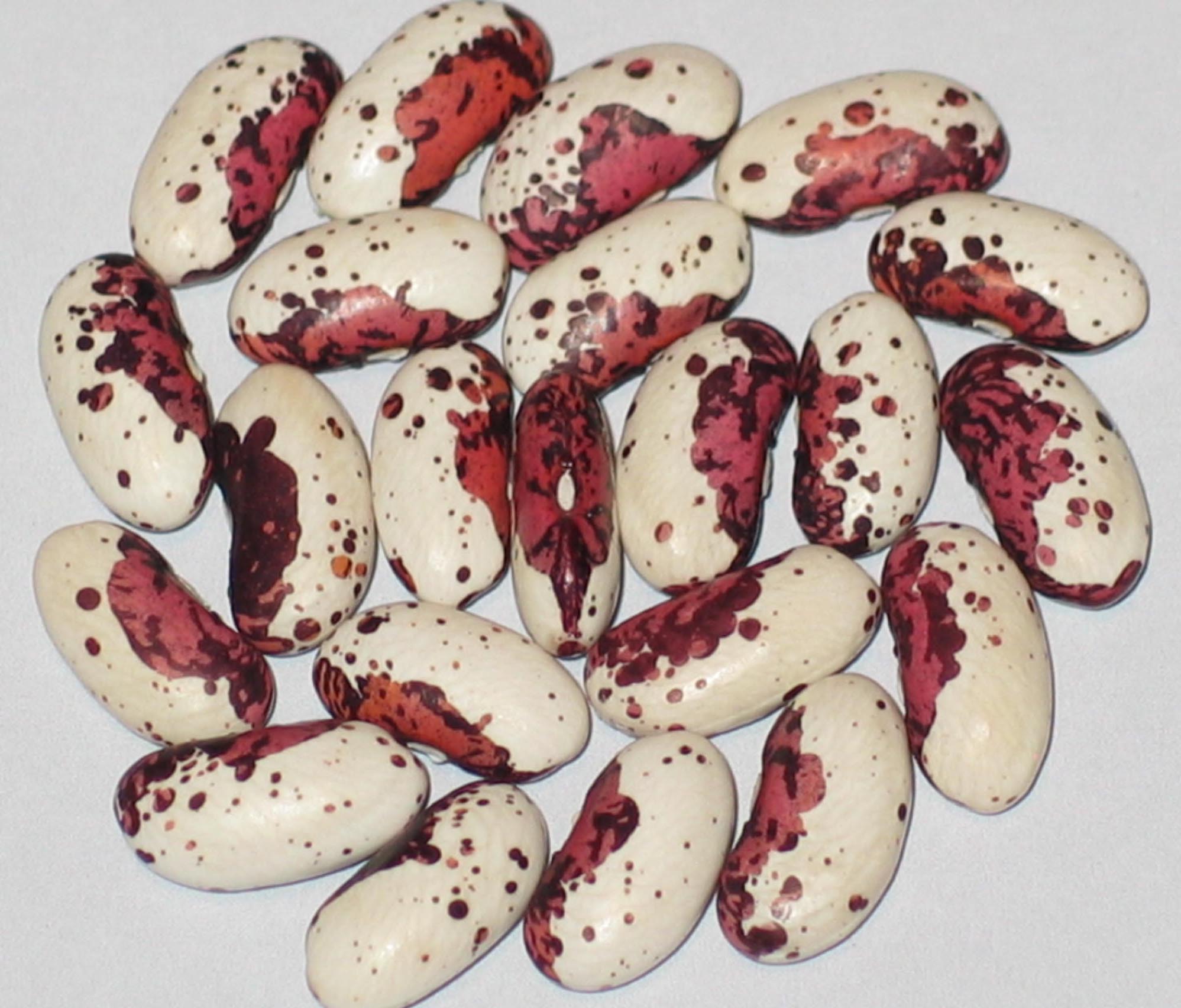
Minnesota Beauty
Packet Size 25 Seeds $5.00
Minnesota Beauty is a bush dry bean variety that requires about 104 days to produce its first dry pods, making it slightly later than other early bush varieties. Characterized by large, non-running plants with very dark foliage, it demonstrates impressive productivity; for instance, 10 plants can yield nearly one pound of seed in when grown here northern Illinois. This bean's genetic material was sourced from Ron Thuma of Hartford, Kansas, who obtained it from the legacy of bean enthusiast Robert Lobitz of Paynesville, Minnesota, after his passing, showcasing a rich heritage of seed saving and cultivation.
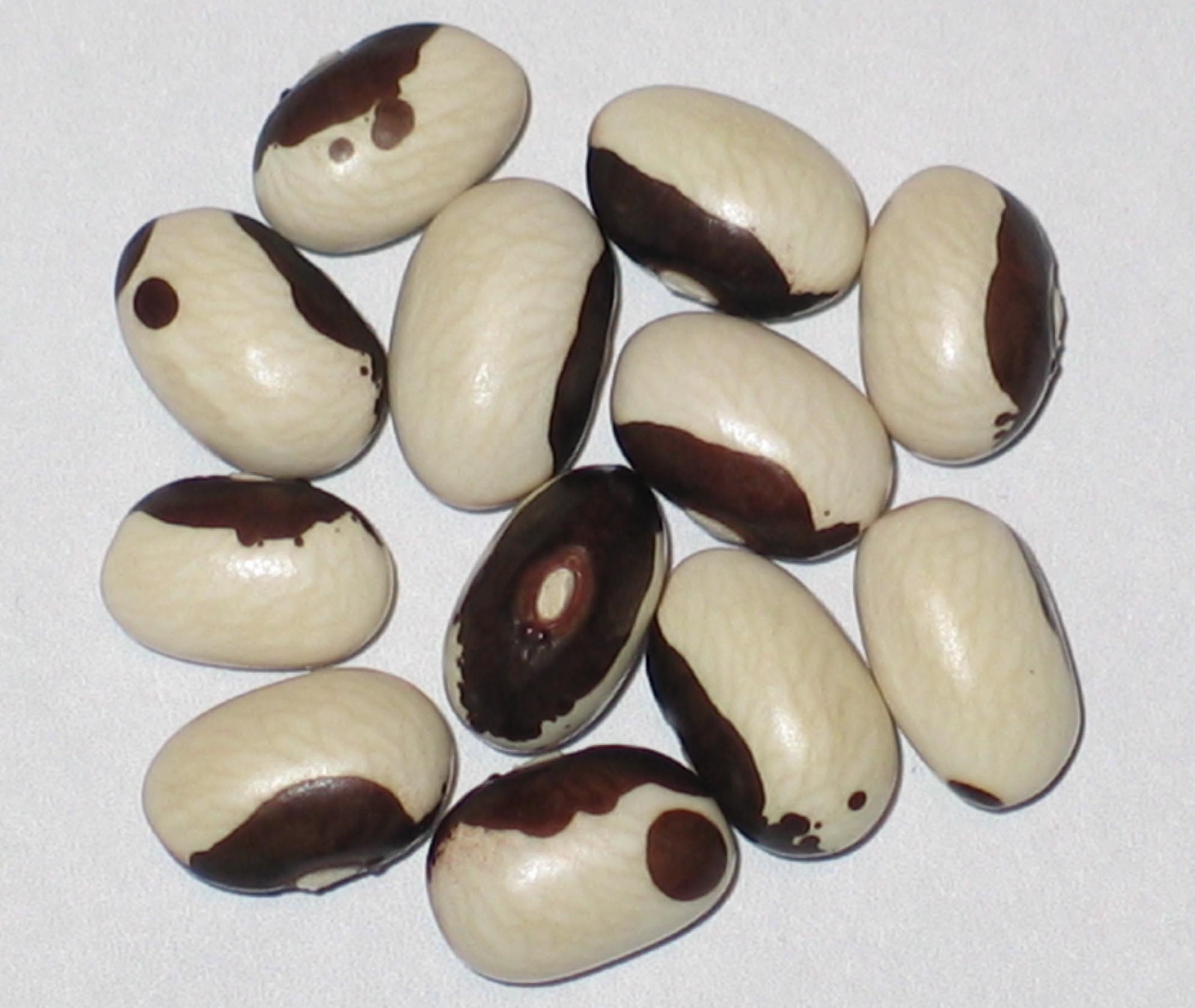
Minnesota 1940's
Packet Size 25 Seeds $5.00
Minnesota 1940s bean is a semi-runner dry variety that matures in approximately 85 days, featuring viney climbing plants that thrive when grown on supports, enhancing their productivity. Acquired from Heritage Harvest Seeds of Canada in 2014, this bean's name reflects its unknown original designation, instead linking it to the era and region of its discovery. Its story underscores the importance of preserving heritage varieties and contributes to the rich tapestry of heirloom agricultural history.
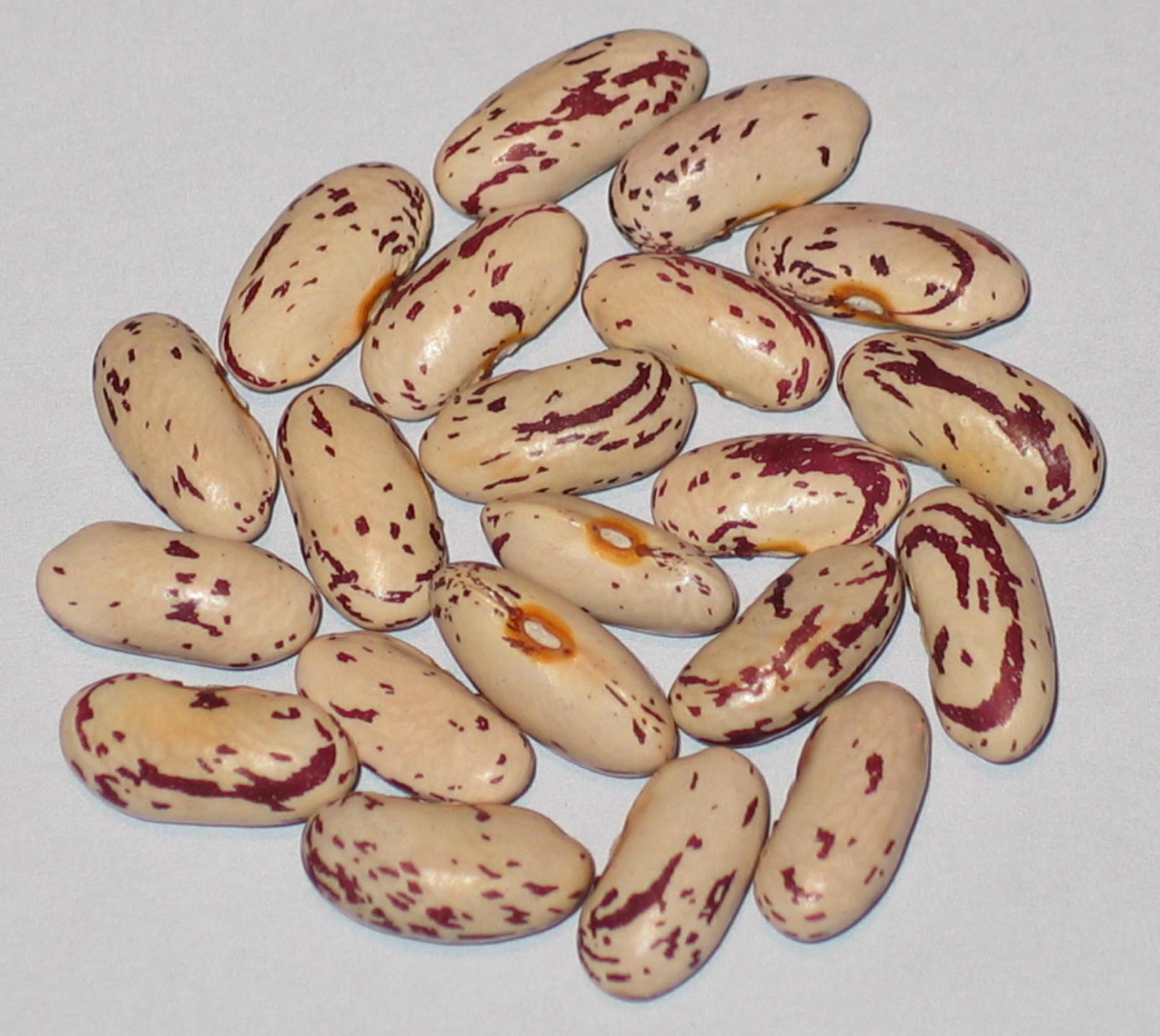
Missouri Bill's
Packet Size 20 Seeds $5.00
Missouri Bill's bean matures in about 95 days, producing attractive rosy white flowers and 5.5-inch-long pods that contain 3 to 5 large cream-colored seeds adorned with red streaks and speckles. These beans are known for their rich, hearty flavor, making them ideal for baking or adding to a winter stews. Acquired from the Ozark Seed Bank, this productive, viney semi-runner dry bean type benefits from support during growth, enhancing its yield and overall vigor.
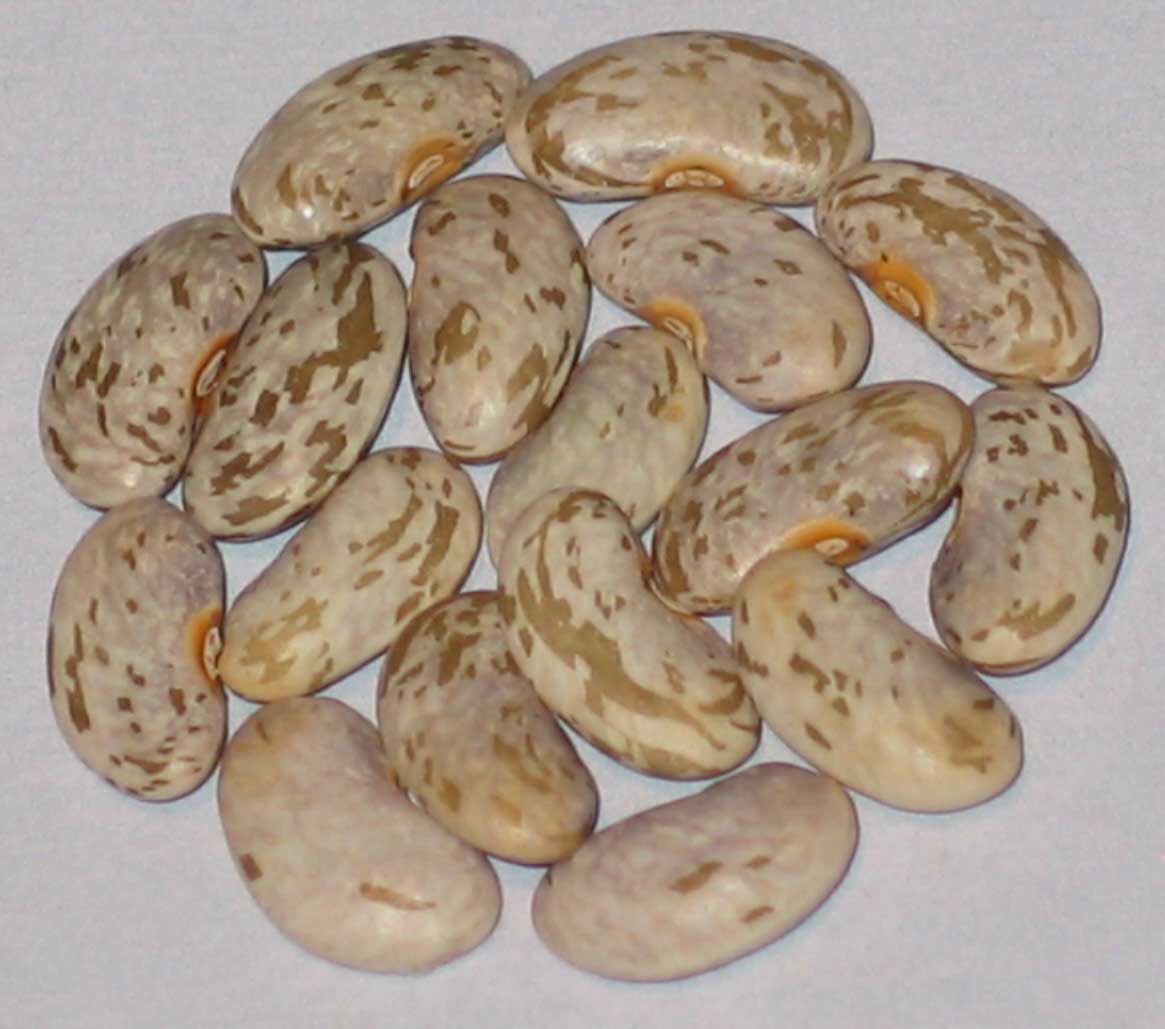
Missouri Wonder
Packet Size 25 Seeds $5.00
Missouri Wonder is a pole/snap bean that reaches maturity in about 70 days, producing stringless green snap pods that were introduced to the seed trade in the 1930s. Farmers of that era valued this variety for its resilience in harsh growing conditions, often cultivating it alongside corn, which provided natural support for the climbing vines. Housewives appreciated Missouri Wonder for its versatility, as it was perfect for fresh eating, canning, and also served as a dry bean option, making it a staple in homes during that time.
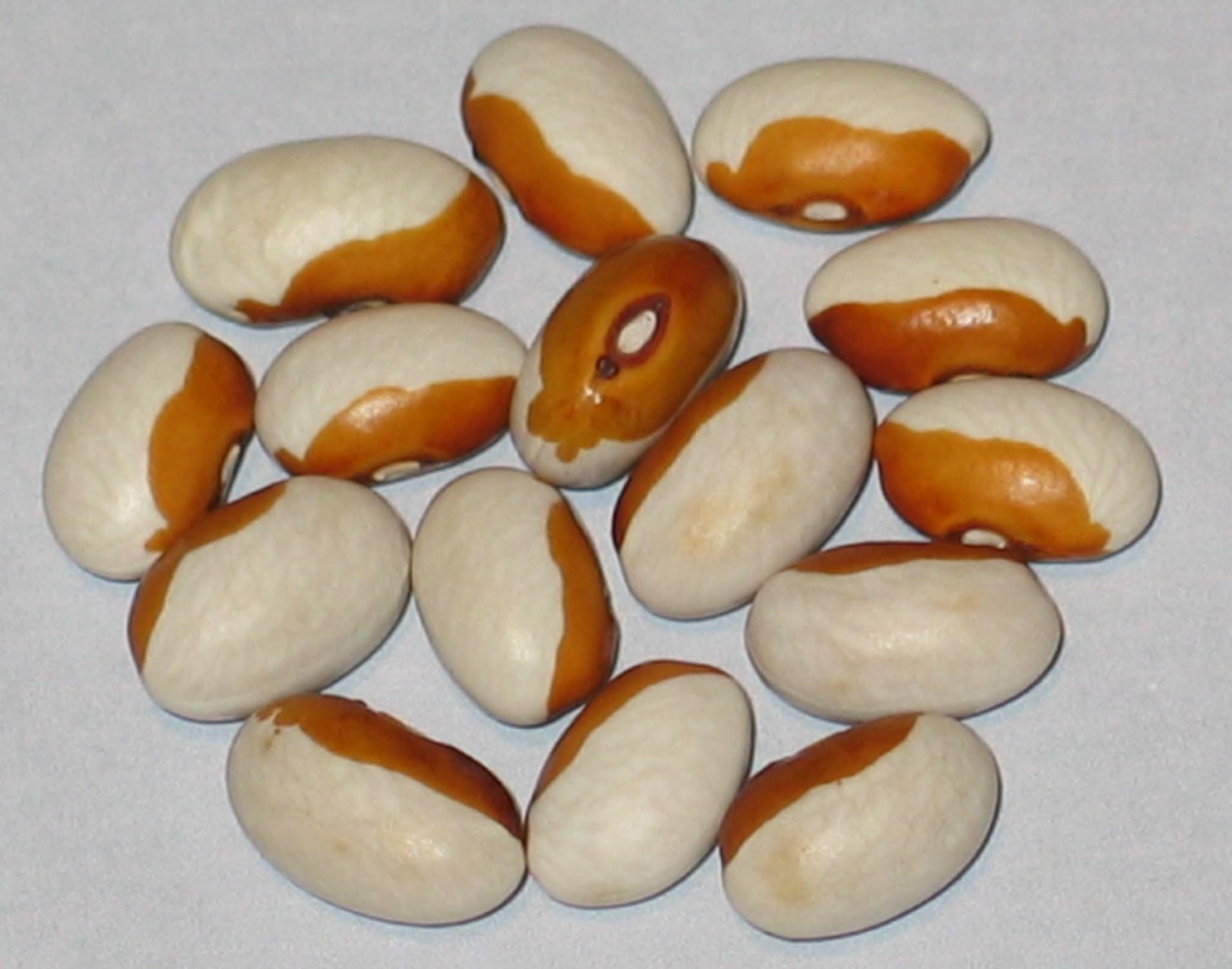
Molasses Face
Packet Size 25 Seeds $5.00
Molasses Face is a semi-runner/dry bean that matures in approximately 80 days, recognized as a traditional New England favorite for soups and baked beans. The plants are productive and exhibit a twinning habit, making them suitable for climbing supports, though they can also be grown as bush beans on the ground. However, for optimal quality and quantity of seeds, providing support is recommended. Each pod is short, typically containing 4 to 5 seeds, enhancing its appeal for various culinary uses.
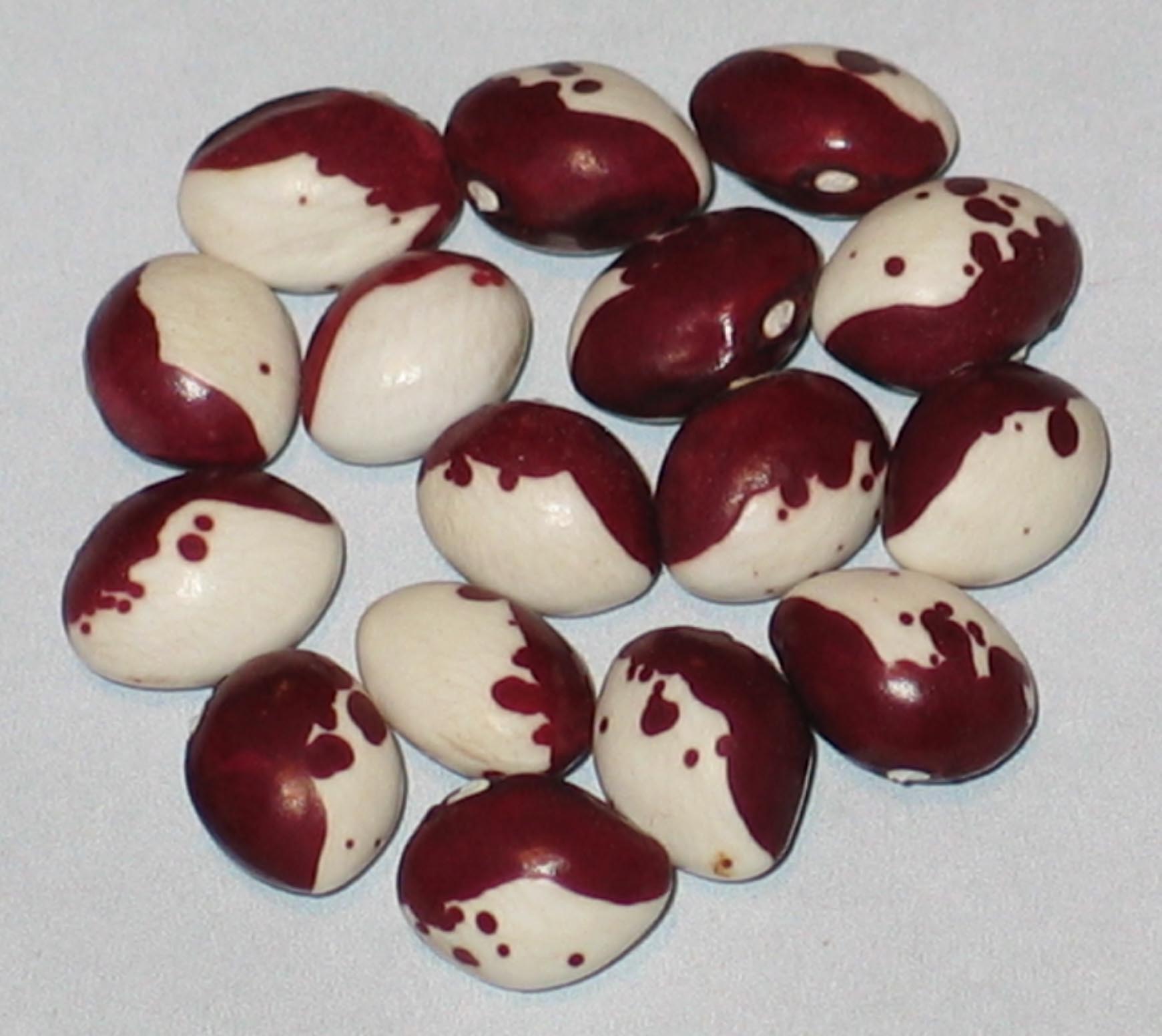
Monachelle Di Trevio
Packet Size 25 Seeds $5.00
Monachelle di Trevio is a productive pole dry bean variety hailing from central Italy, specifically linked to the town of Trevio, as indicated by its name. This rare cultivar is cultivated by only a small number of farmers in its native region. When grown in northern Illinois, it has produced excellent high-quality seed crops, showcasing its adaptability and robust growth potential outside its traditional environment.
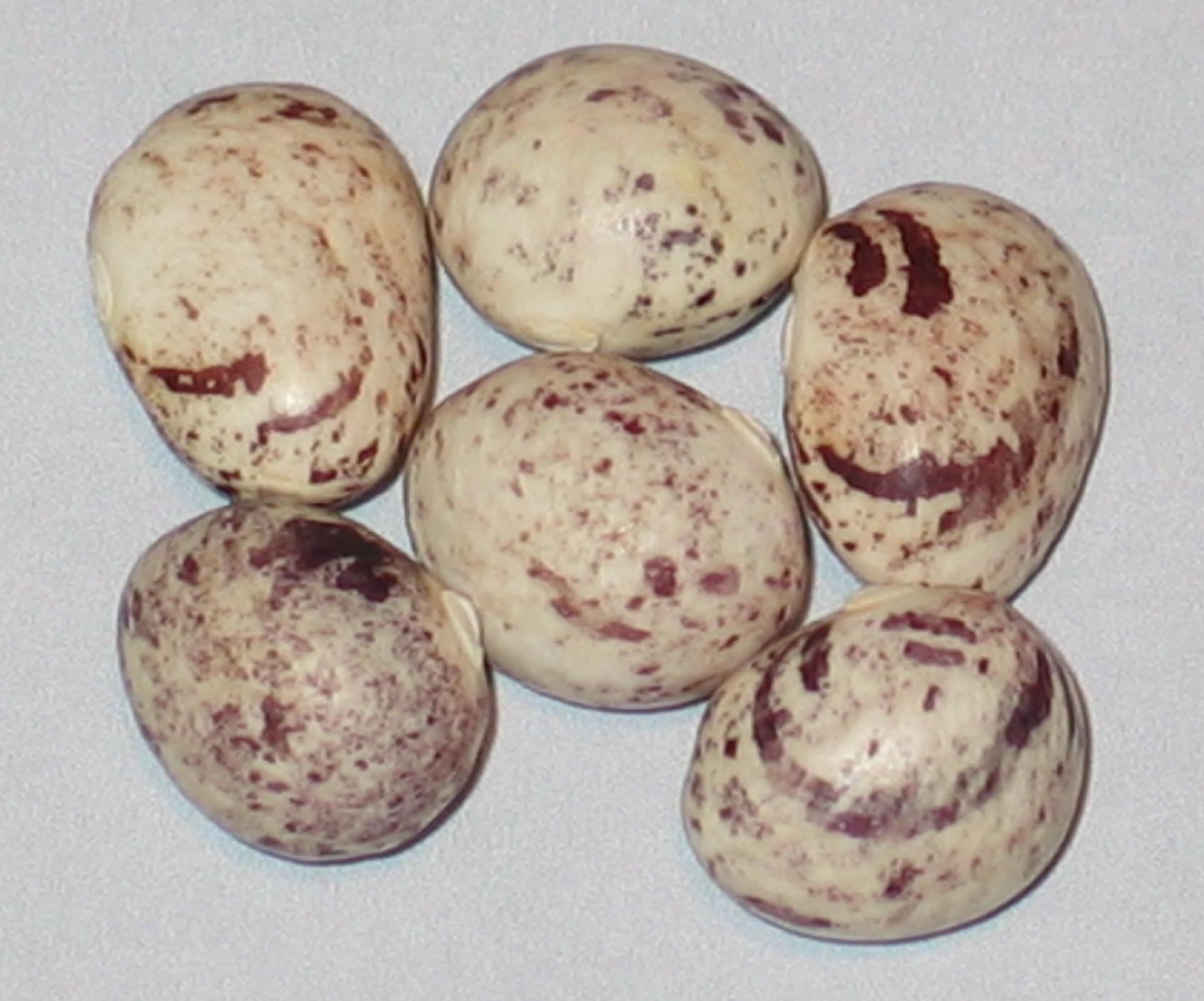
Mona Lisa
Packet Size 25 Seeds $5.00
Mona Lisa is a striking pole dry bean variety developed from a collaboration between bean collector Erich Gerencser and Harriet Mella in Liebenfels, Austria, with one of its parent beans being a Kipfler bean. This variety was first planted in northern Illinois in the summer of 2015, where it demonstrated remarkable productivity, yielding nearly a thousand seeds from just eight planted. Its unique heritage and impressive seed production make it a noteworthy addition to any bean collection.
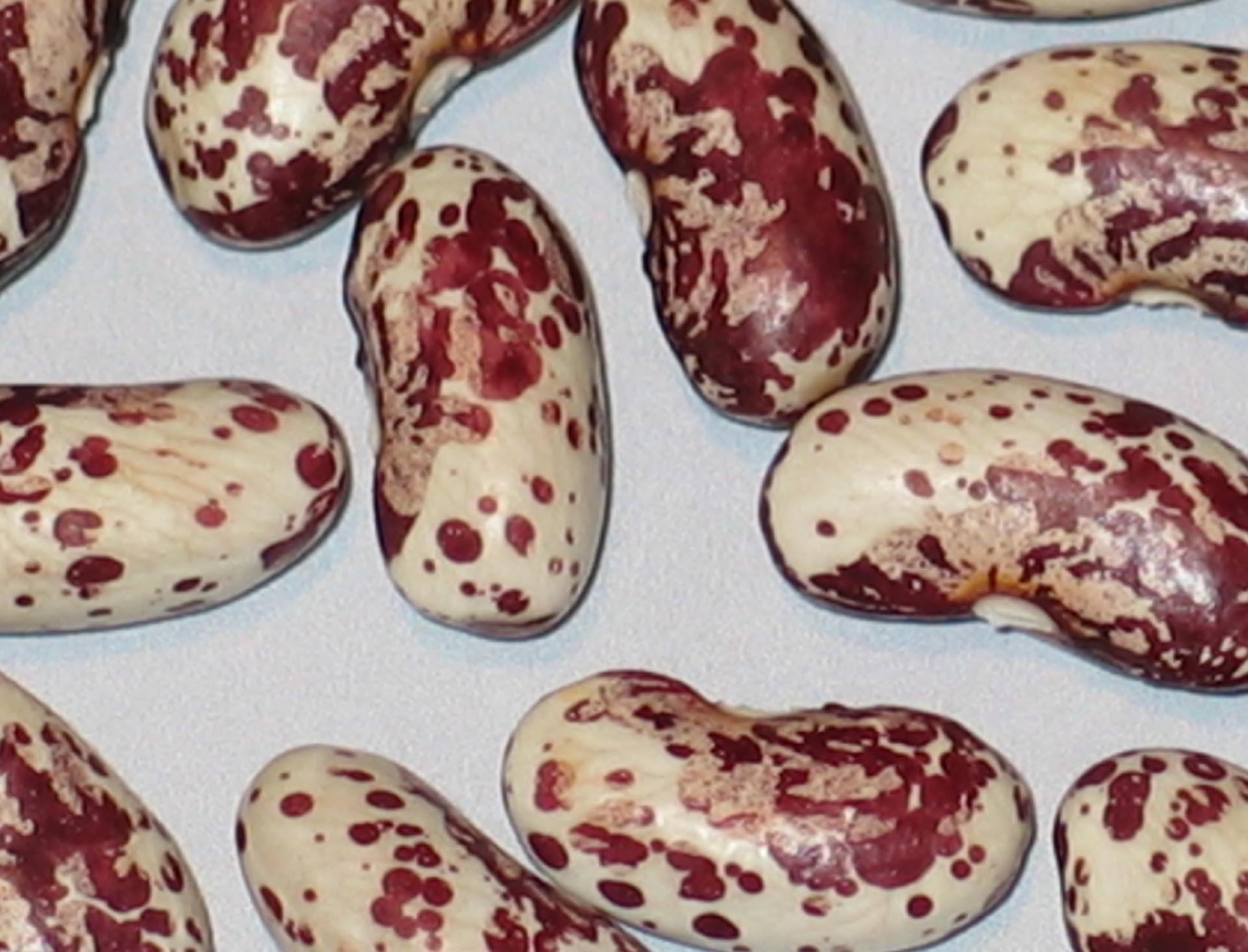
Money
Packet Size 20 Seeds $5.00
Money is a bush dry bean variety that matures in approximately 80 days, featuring a distinctive seed coat patterned similarly to Jacob's Cattle but with an additional mottled third color interspersed within the darker red areas. Developed in England, this cultivar has a rich history and was once included in the seed catalog of the renowned bean collector John Withee as part of his Wanigan Associates network, adding to its historical significance and appeal for bean enthusiasts.
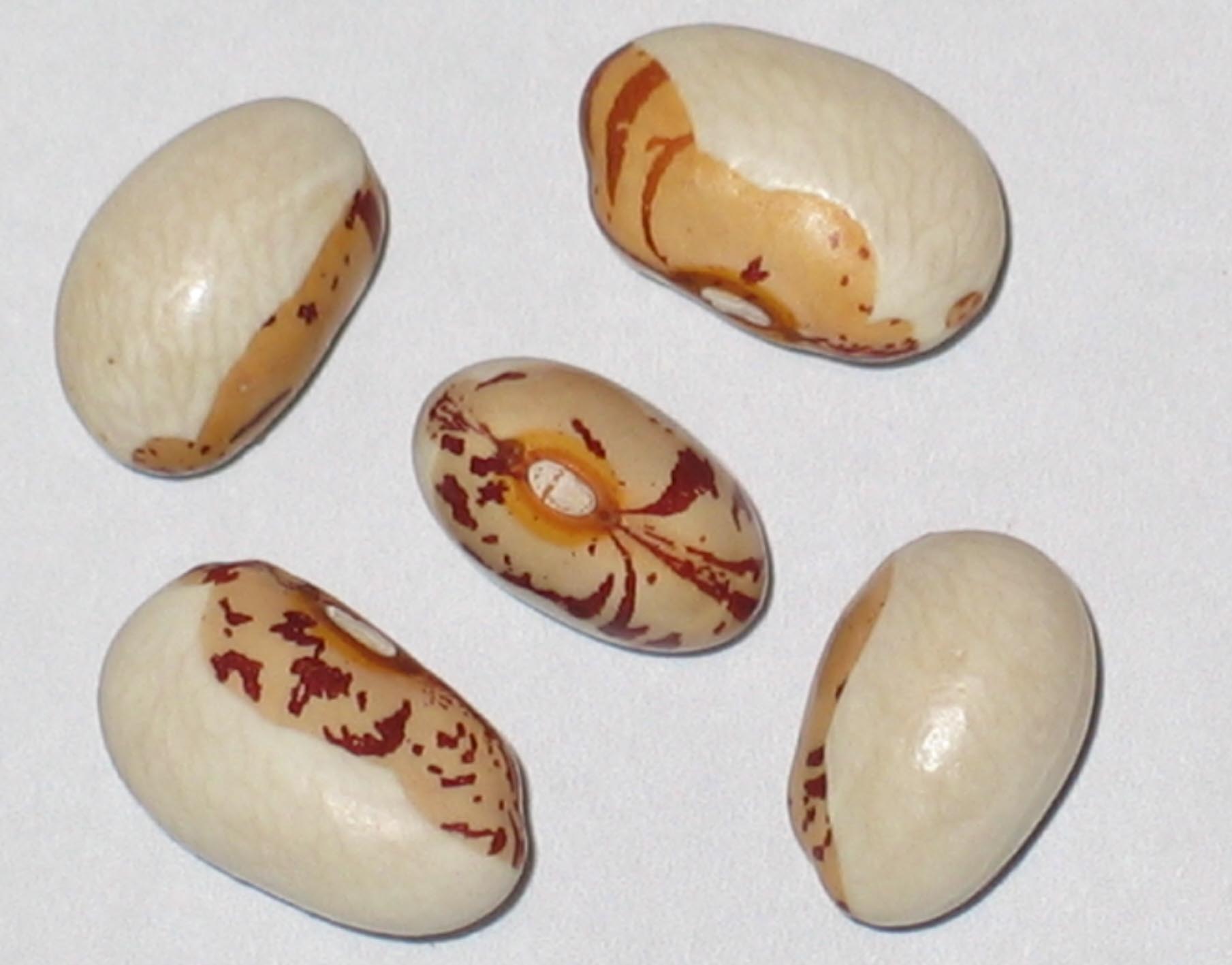
Mostoller Wild Goose
Packet Size 20 Seeds $5.00
Pole Dry. Mostoller Wild Goose. 100 days to mature it's first dry seed. White blossoms and vigorous, productive plants. Pods are flattened, wide which average about 4 seeds per pod. The unique story of this bean dates back to the autumn 1865 when one of the two sons of Joseph Mostoller shot a lone goose on a river in Somerset county Pennsylvania. Upon prepping the goose for a meal Joseph's Wife Sara found the unusual beans in the goose's crop. Dried and planted them in the spring of 1866. The bean is still with us after seven generations.
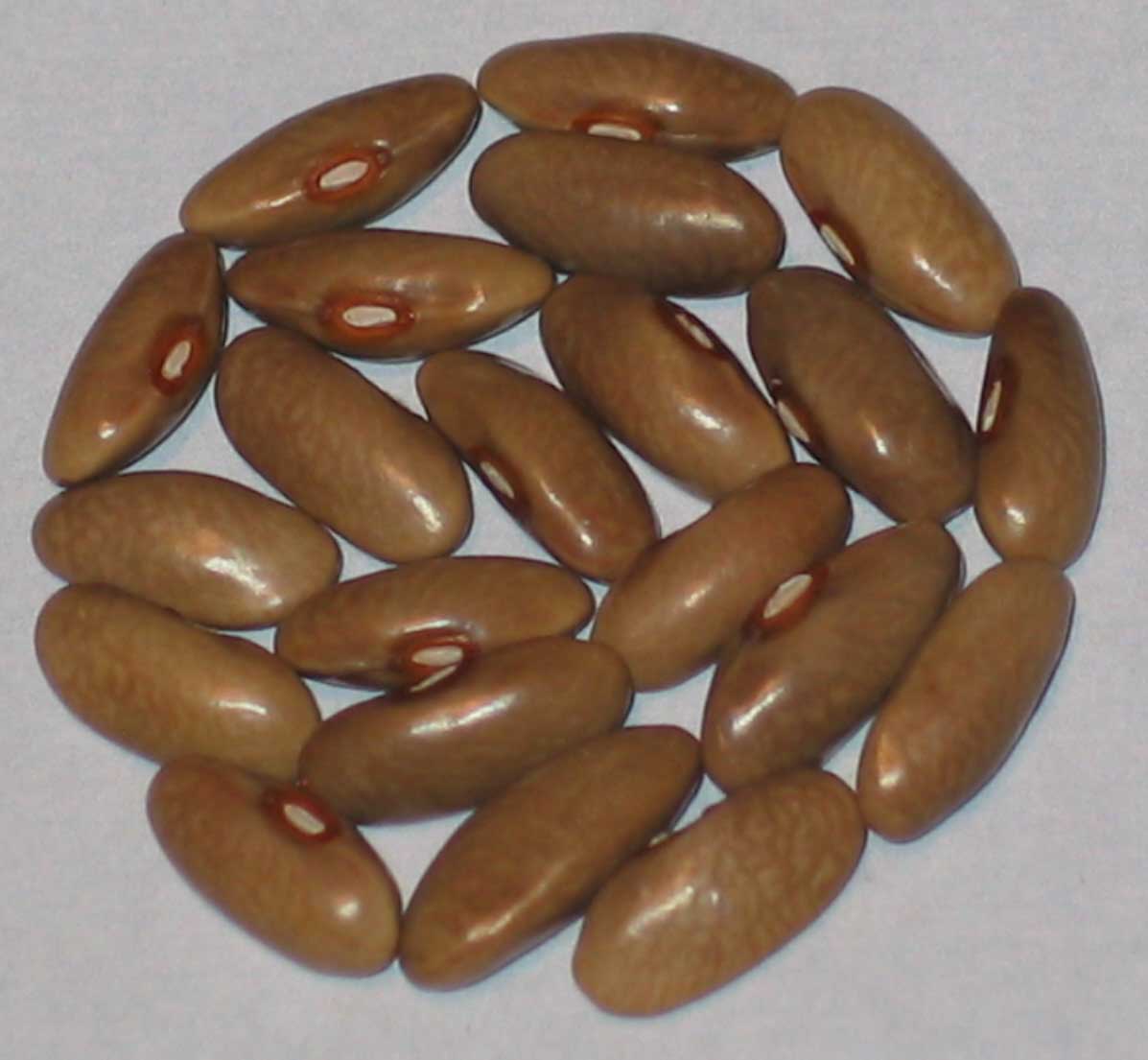
Mr Tung
Packet Size 25 Seeds $5.00
Pole Snap. Delicous stringless snap green pods in 65 days. This bean was gifted to me by a Annette Barley of Nanimo, BC Canada in 2014. The Story of this bean is that a Chinese laborer who was hired in the early 1900ís to take care of the gardens on 50 acres of the James D. Kerr farm In Long Beach, British Columbia. Grew these beans in their gardens. After 25 years Mr. Tung returned to China and the Kerr family preserved this bean by continuing to grow it.
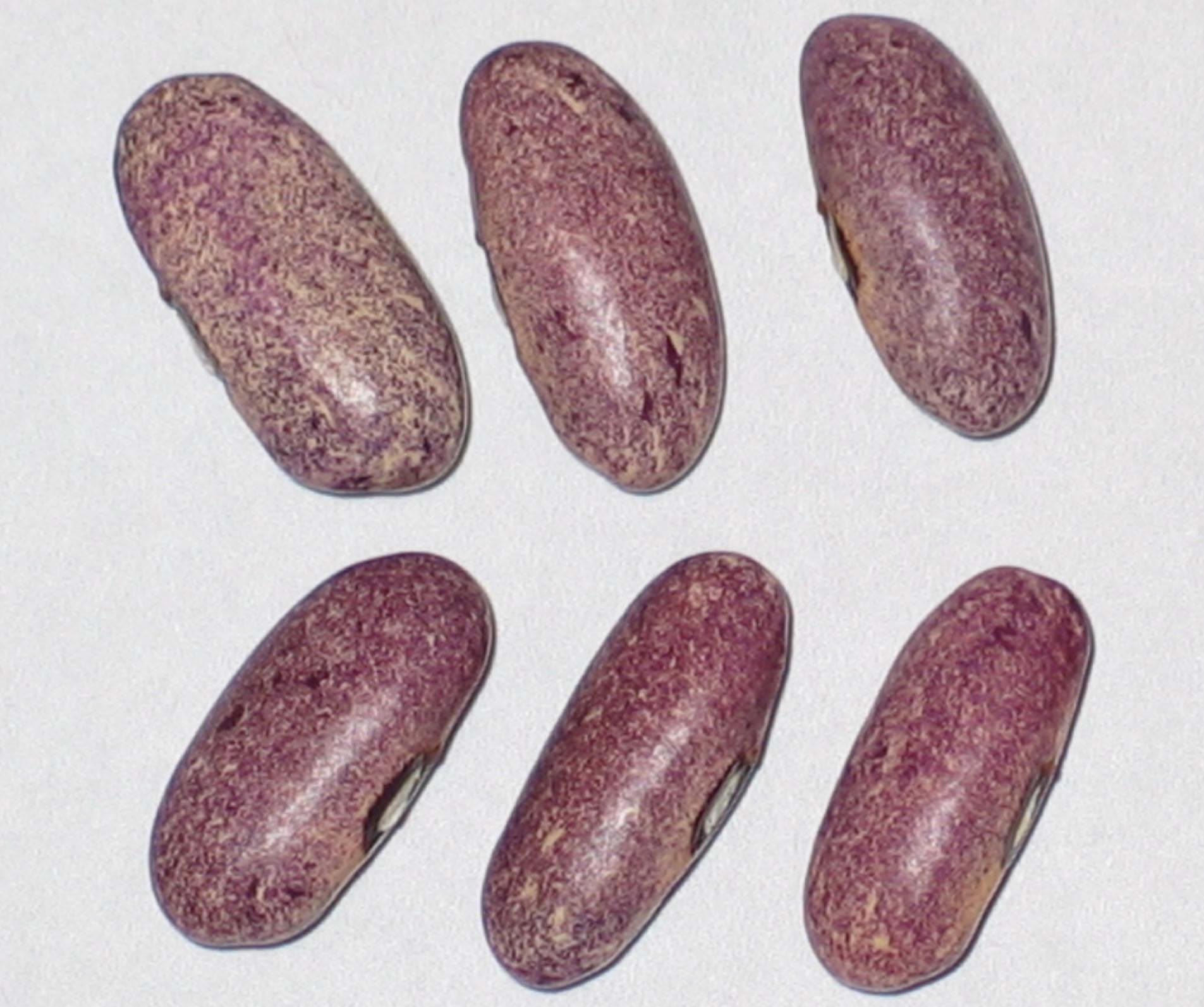
Mrociumere
Packet Size 25 Seeds $5.00
Mrociumere, also known as Swahili Kijiru, is a rare heirloom bush dry bean from Kenya that matures to dry seed in over 90 days. This productive variety features 15-inch tall upright plants adorned with white blossoms and produces 6-inch oval pods. The beans are particularly striking, characterized by speckled purple coloration and a shimmery undertone, making them not only aesthetically pleasing but also highly productive, even thriving in shorter, cooler climates, which enhances their unique versatility among beans.
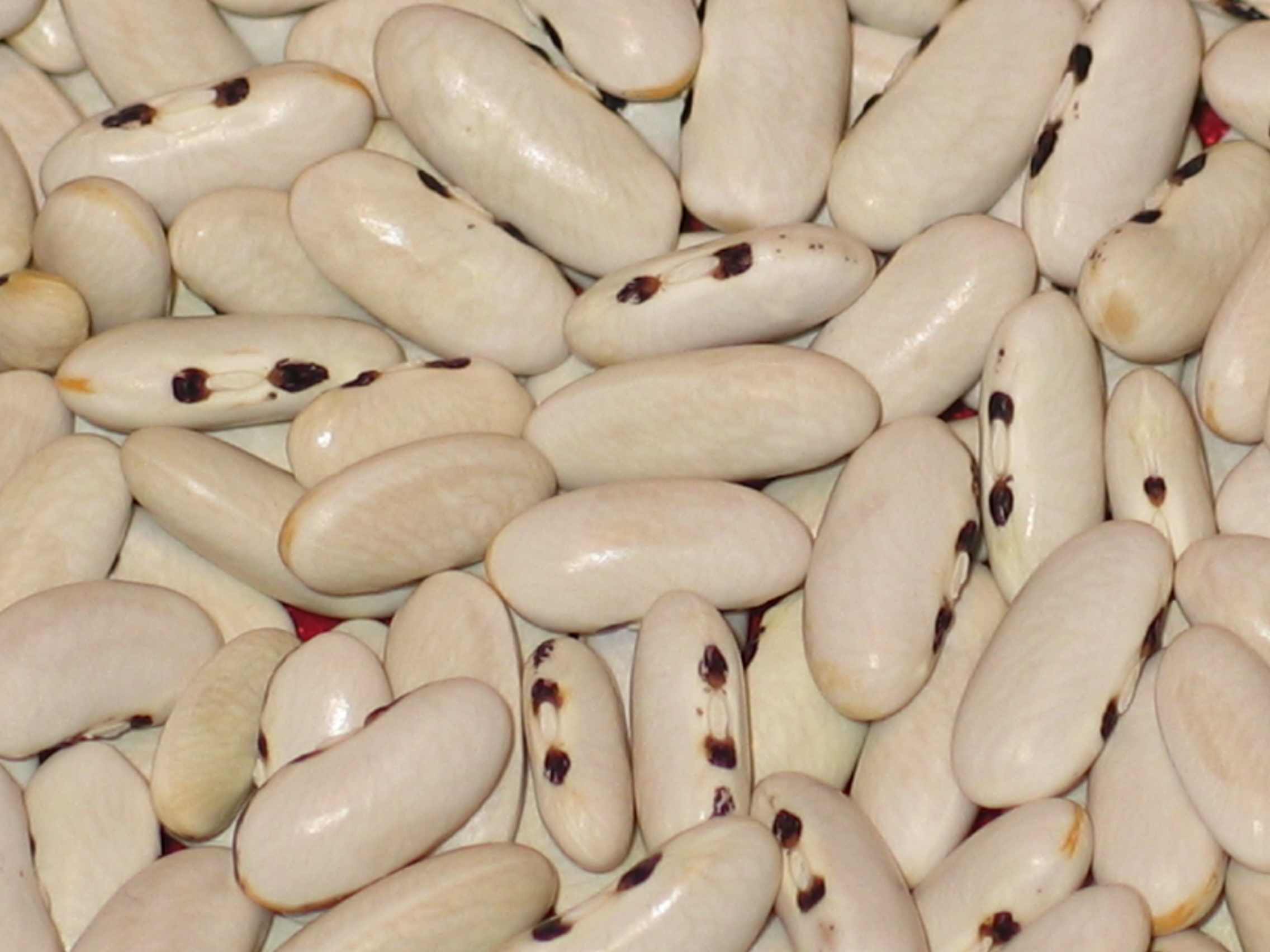
Mulldoon
Packet Size 30 Seeds $5.00
Mulldoon is a bush dry bean that matures inapproximately 82 days, with pods drying sequentially after reaching maturity. The plants are high yielding, upright, and grow to 18-20 inches tall without runners, featuring white blossoms and producing 7 ľ inch long slender oval pods. Discovered in its seed mother, Jacob's Cattle Amish, in 2014, this bean has been nurtured and closely observed since, proving to be outstandingly productive for a bush variety. Its mild-tasting white beans are particularly excellent in soups and baked beans, making it a versatile addition to any kitchen.
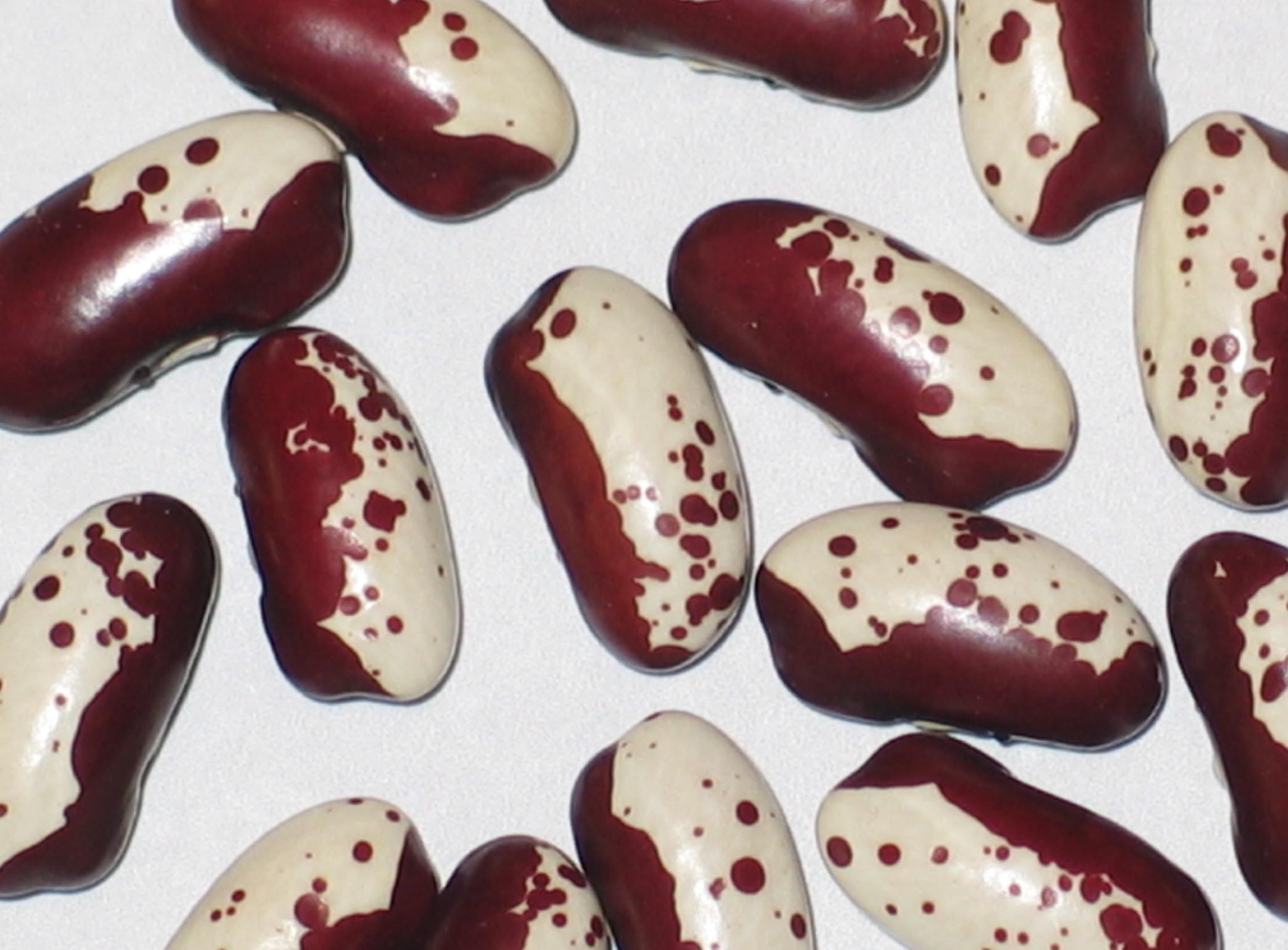
Neabels Ukrainian
SOLD OUT
Neabels Ukrainian is a pole dry bean distinguished by its larger seeds, which feature a color pattern similar to Jacob's Cattle but holds its appearance better when grown in different conditions. Purchased from Annapolis Seeds in Nova Scotia, Canada, in 2014, this bean is part of the rich agricultural heritage of Ukrainian beans, showcasing both resilience and adaptability. It represents a vital connection to the diverse variety of beans cultivated in Ukraine, making it a valuable addition to any heirloom collection.

Neptune
Packet Size 20 Seeds $5.00
Neptune is a pole lima bean that typically requires over 100 dry days to mature, characterized by its strong, vigorous growing vines and high productivity. Initially grown since the early 1980s, this variety was received from an unlisted SSE member, E.P. Griggs, who did not know its original name. Inspired by images of Jupiter and its moons in National Geographic magazine, I had named a couple of limas he had sent to me. However I named this bean after the planet Neptune, and after 30 years, the name has undeniably become established. Its connection to celestial inspiration adds a unique touch to its cultivation history.
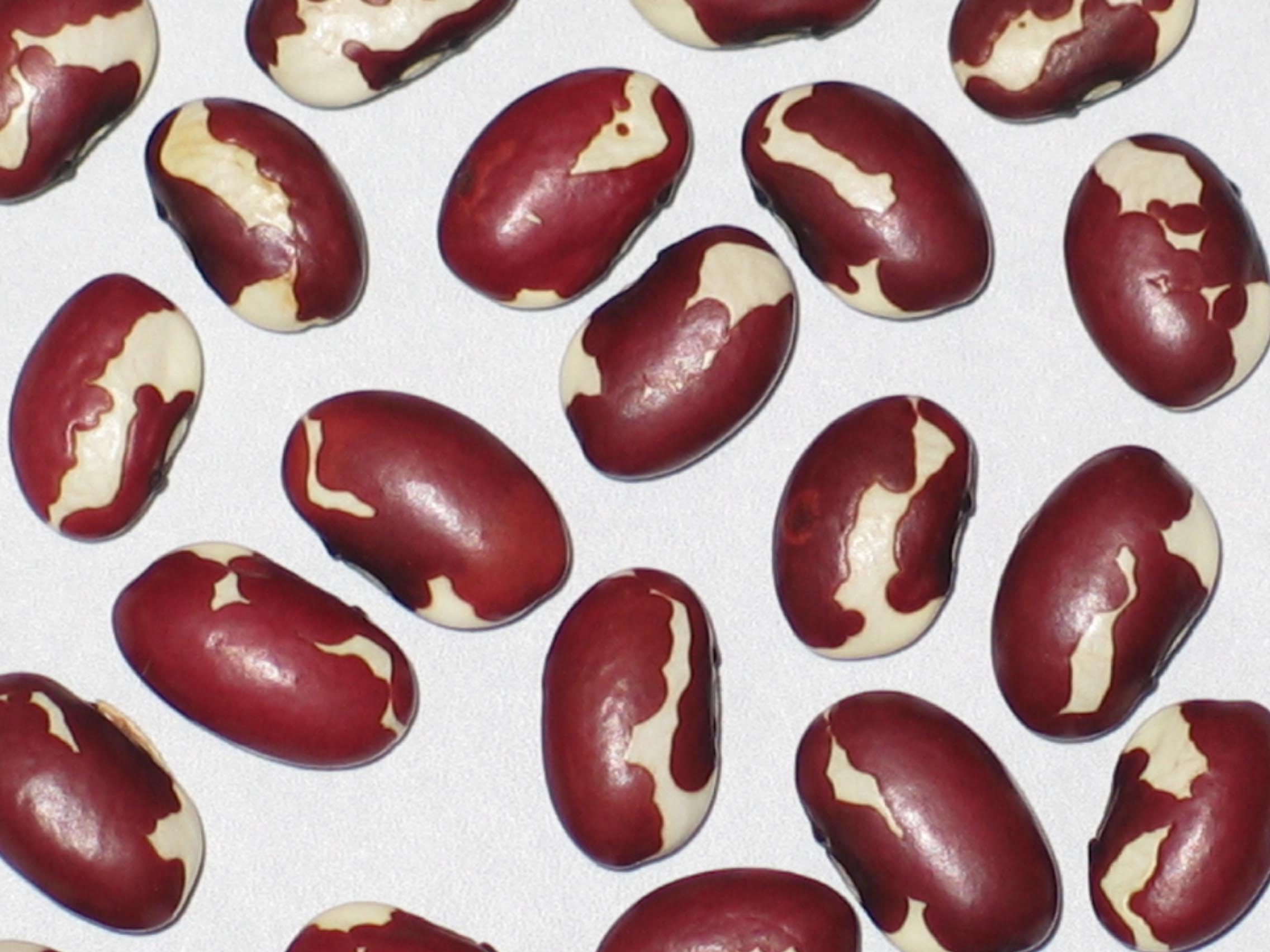
New Mexico Red Appaloosa
Packet Size 25 Seeds $5.00
New Mexico Red Appaloosa is a pole dry bean that takes about 90 days to produce dry seeds, featuring light, highly productive vines that set pods later in the season. Believed to have been first cultivated by cliff-dwelling tribes in New Mexico, this variety thrives in hot, dry summers and is celebrated for its excellent flavor. When cooked, the beans retain some of their maroon pigmentation, adding both visual appeal and a connection to their rich cultural heritage in the region..
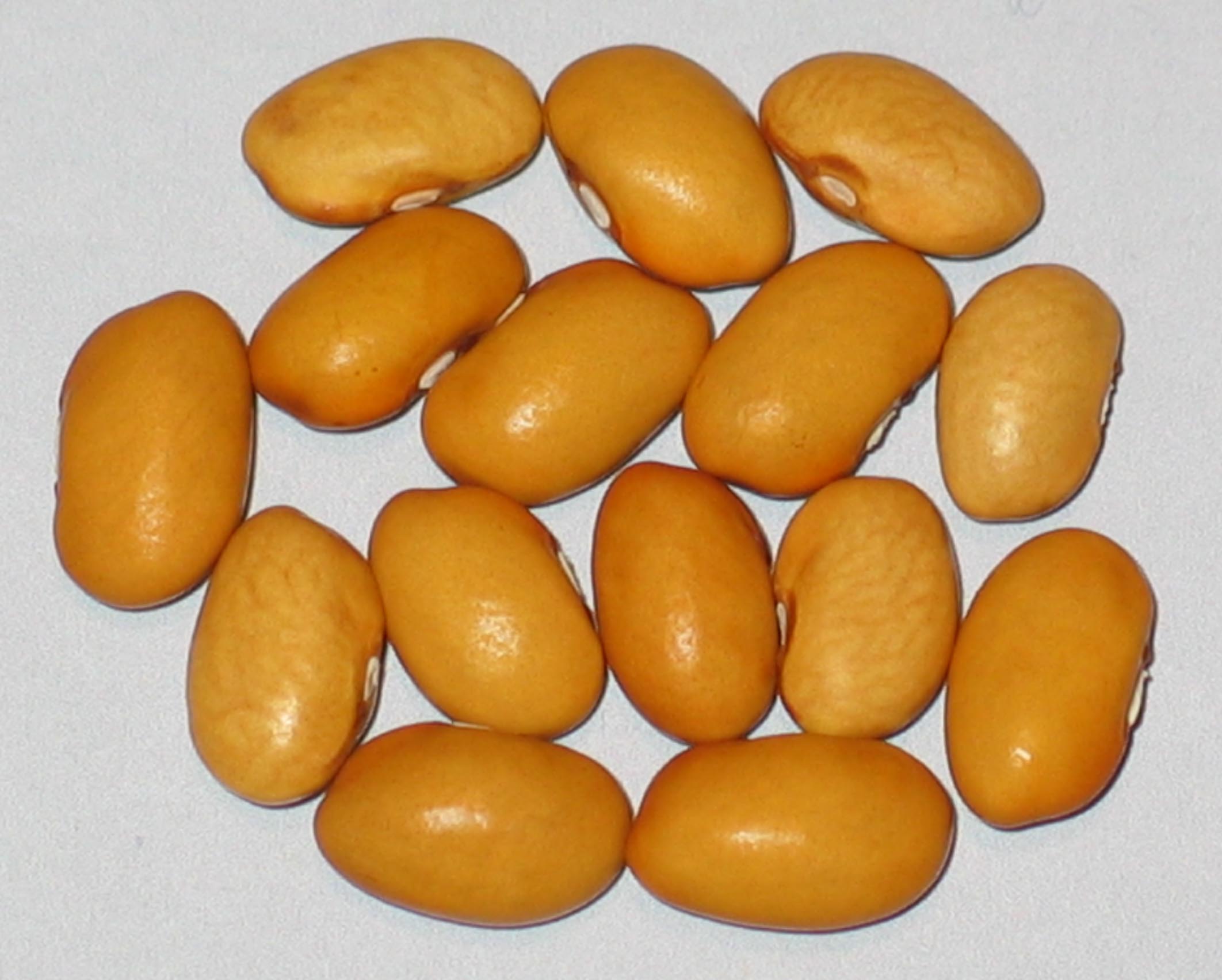
Nez Perce
Packet Size 35 Seeds $5.00
Nez Perce is a semi-runner dry bean known for its early maturity and good yield, easy shelling pods. This small, golden bean has a mild creamy flavor, an excellent all-purpose option, excellent refried. Reliable in cool summers or short-season climates, short, indeterminate plants. Believed to have originated with the Nez Perce tribe in Eastern Oregon and Idaho, its history remains somewhat unclear, as similar varieties were also cultivated by other tribes, potentially introduced by settlers. The bean gained popularity in northern Idaho during the 1930s, where it was maintained for generations after being initially grown by Henry Marcus Purnell.
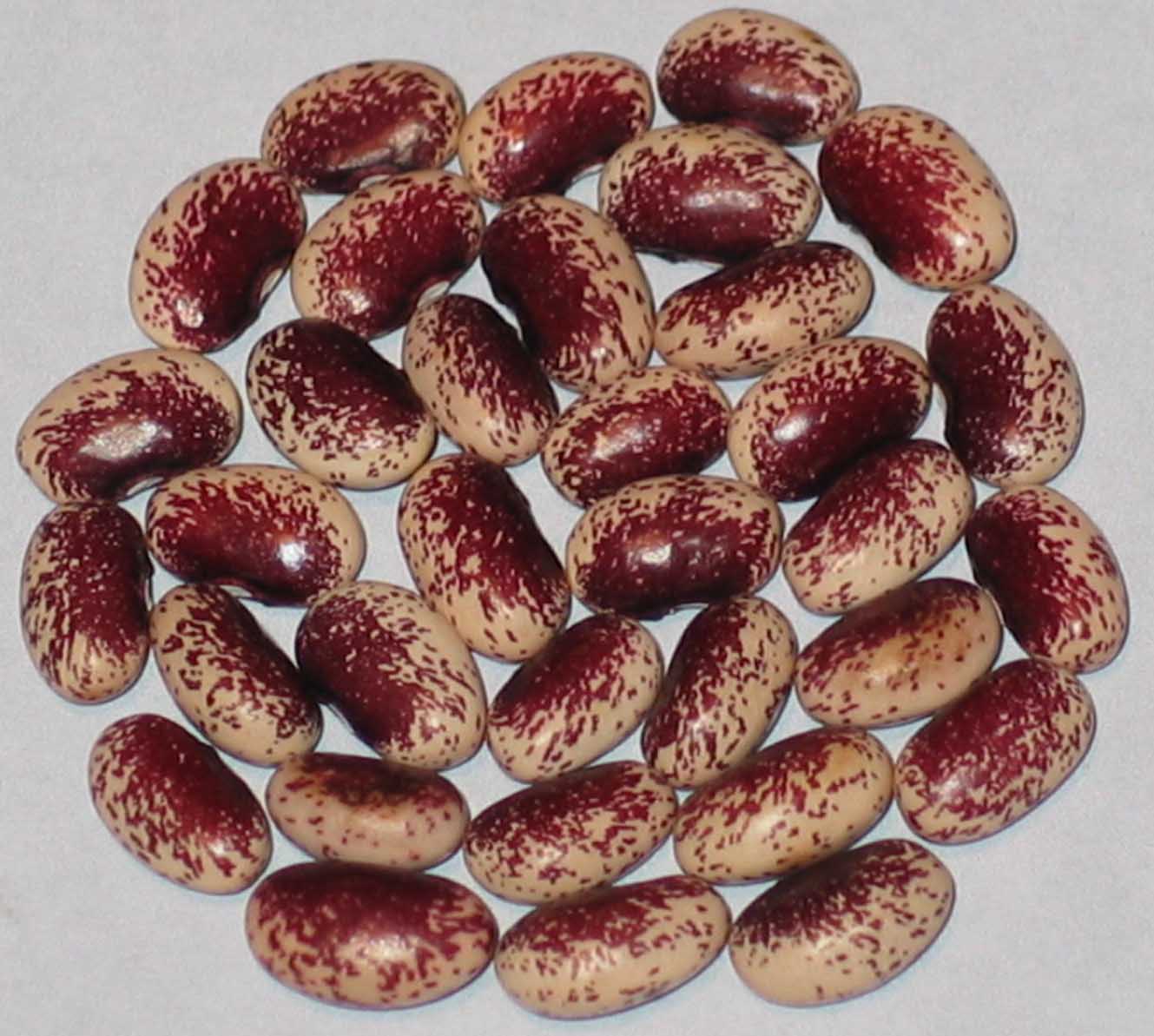
Nigel
Packet Size 35 Seeds $5.00
Bush dry. 100+ DTM. Very productive plants about 20 inches tall. 4.5 inch slightly wrinkled easy to hand shell pods. It has a small seed size but produces them profusely. Wayne James of Tierra Farms in California had gotten the bean from Nigel Walker of Eat Well farms in that state. My donor from Catasauqua, Pennsylvania had obtained this bean at the Appalachian Seed Swap in Pikeville, Kentucky in 2018 before sending me the bean in the autumn of 2019.
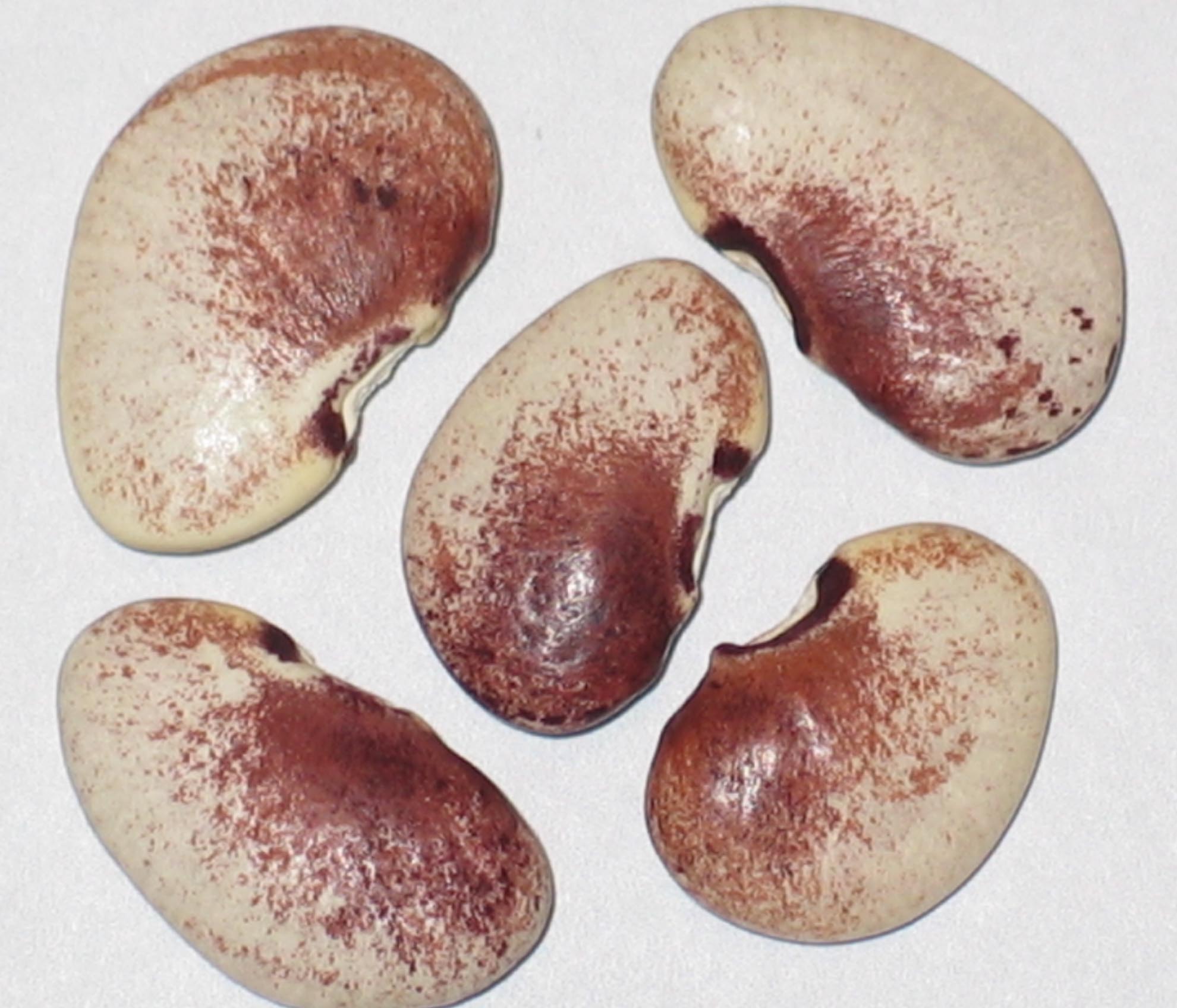
North Pole
SOLD OUT
Pole/Large Lima. 100+ DTM. Originally called Winfield as it originated with a Mrs. Winfield of Painted Post, NY. Introduced to the seed trade by the Billy Hepler Seed Company starting in 1953. Billy started his company at the age of 12. A cross of Cowey and Christmas Limas. The original cross likely occurred in the 1940ís. After Billyís dad passed in 1962, Hepler's inventory was sold to Farmer Seed & Nursery Company of Faribault, MN. Farmer's 1965 catalog states North Pole is new to their listings. No reference to North Pole can seem to be found anywhere prior to Farmerís release in 1965. The name was probably changed for commercial reasons.
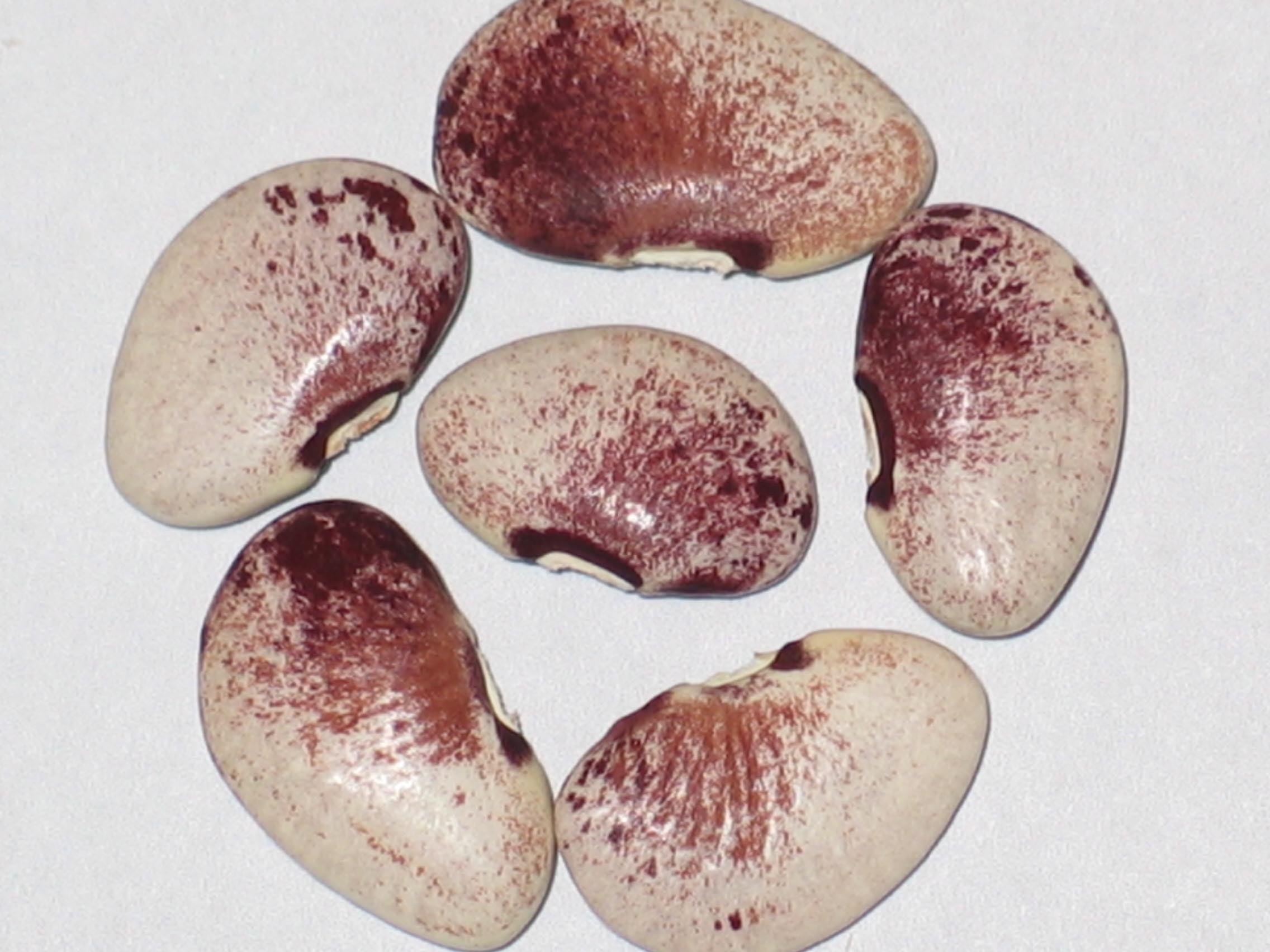
North Star
Packet Size 12 Seeds $5.00
This large-seeded pole lima variety takes over 100 days to produce its first dry seeds. I first successfully cultivated this bean in northern Illinois as far back as the early 1980s. The seeds are uniquely colored and patterned, reminiscent of the North Pole Lima. Unfortunately, the history of this bean remains a mystery, with no documented background available. The North Star offers a mild flavor.
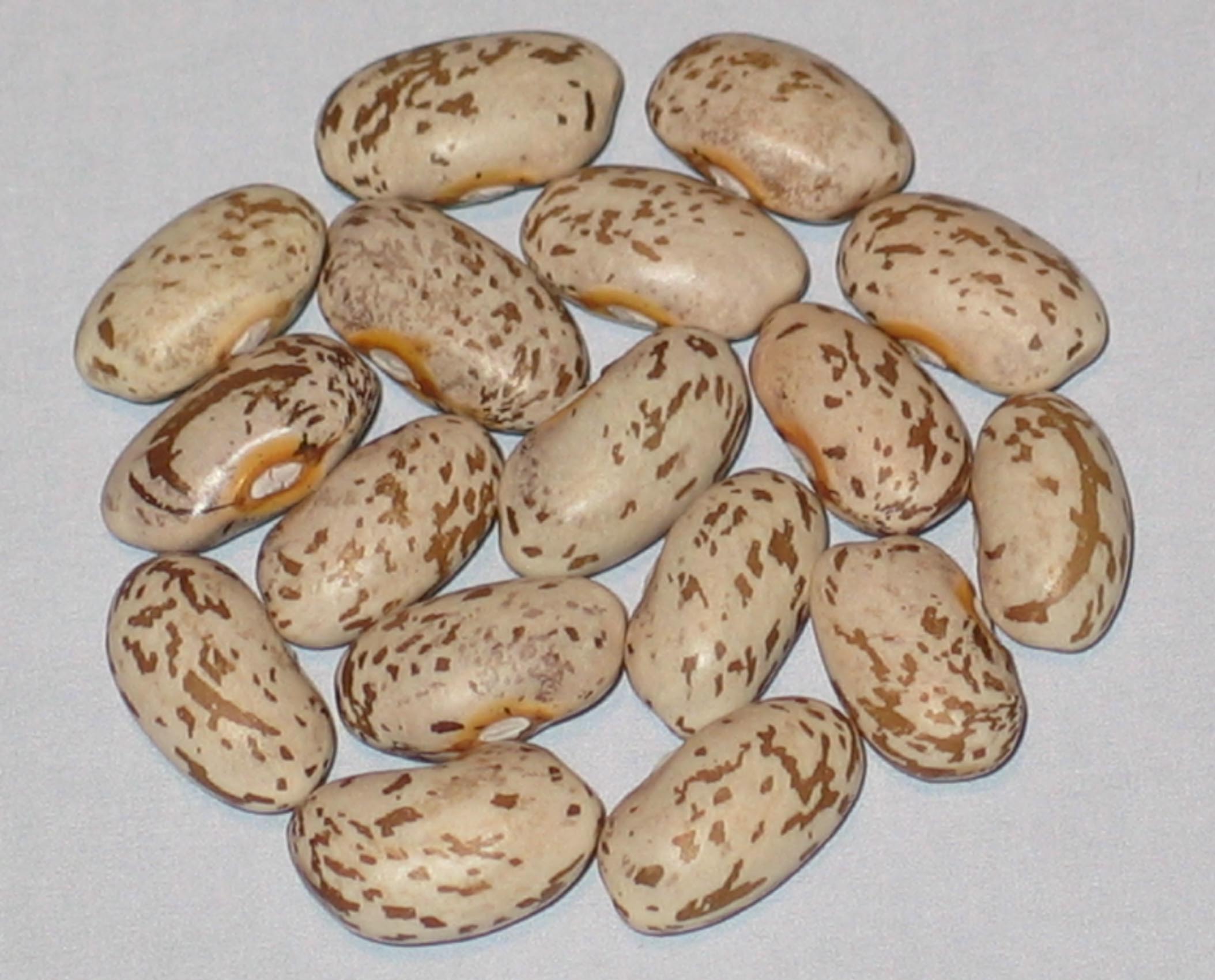
North Star Bush Pinto
Packet Size 30 Seeds $5.00
This productive bush dry bean matures in just 85 days, with the initial dry pods appearing early in the season. The rest of the pinto crop typically dries within three weeks, depending on weather conditions. Released in 1999 by the late Robert Lobitz of Paynesville, Minnesota, the North Star Bush Pinto is regarded as the very first true bush pinto variety.
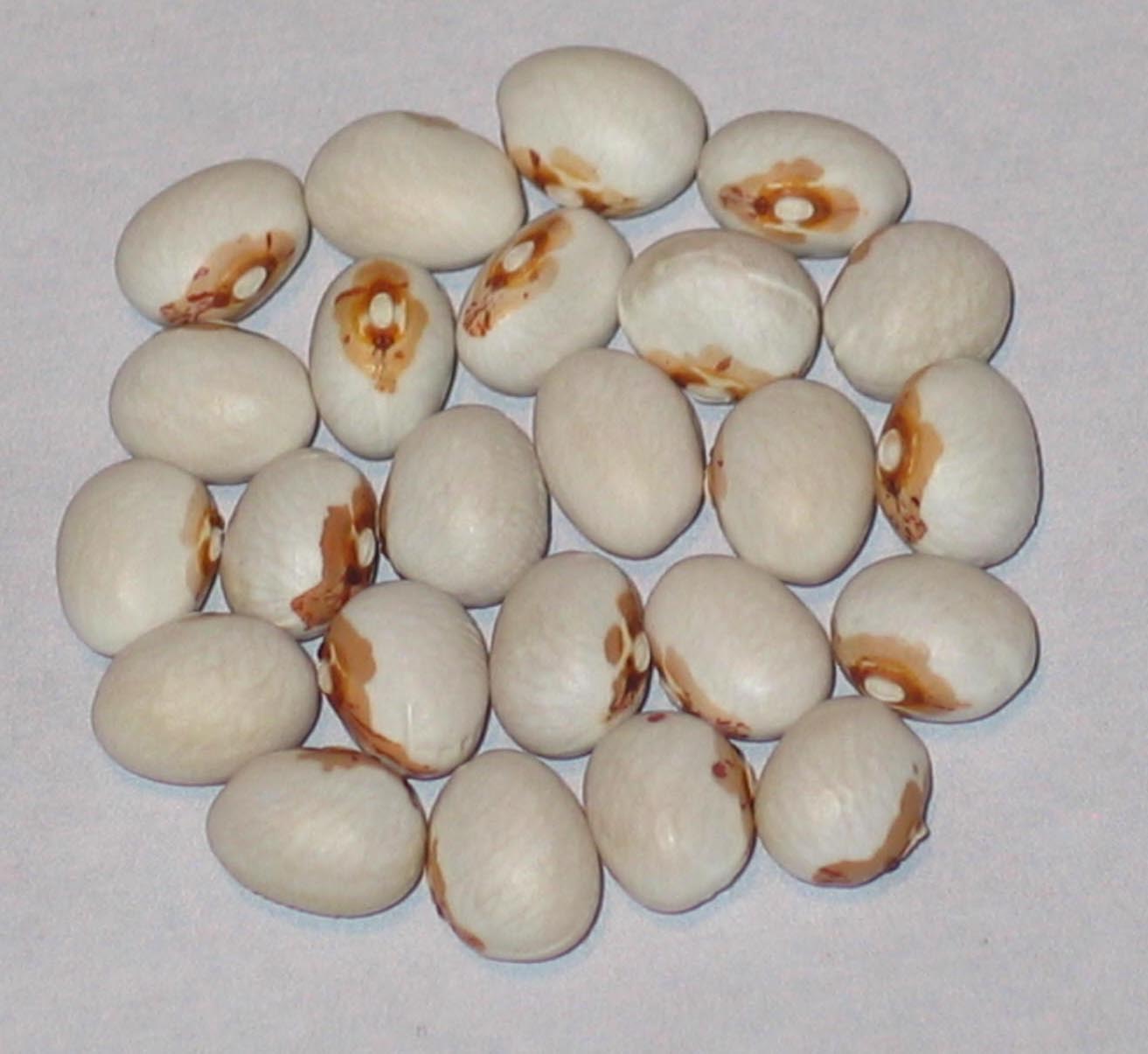
North Town Brown Eye
Packet Size 30 Seeds $5.00
The North Town Brown Eye is a bush dry bean that yields its first dry pods in about 85 days. This variety features 18-inch tall plants adorned with attractive pink blossoms. The 4.25-inch long pods house oval white beans, each uniquely decorated with a golden yellow figure around the eye. An original creation by the late Robert Lobitz, this bean serves as another distinctive yellow eye type, adding to Lobitz's legacy in bean cultivation.
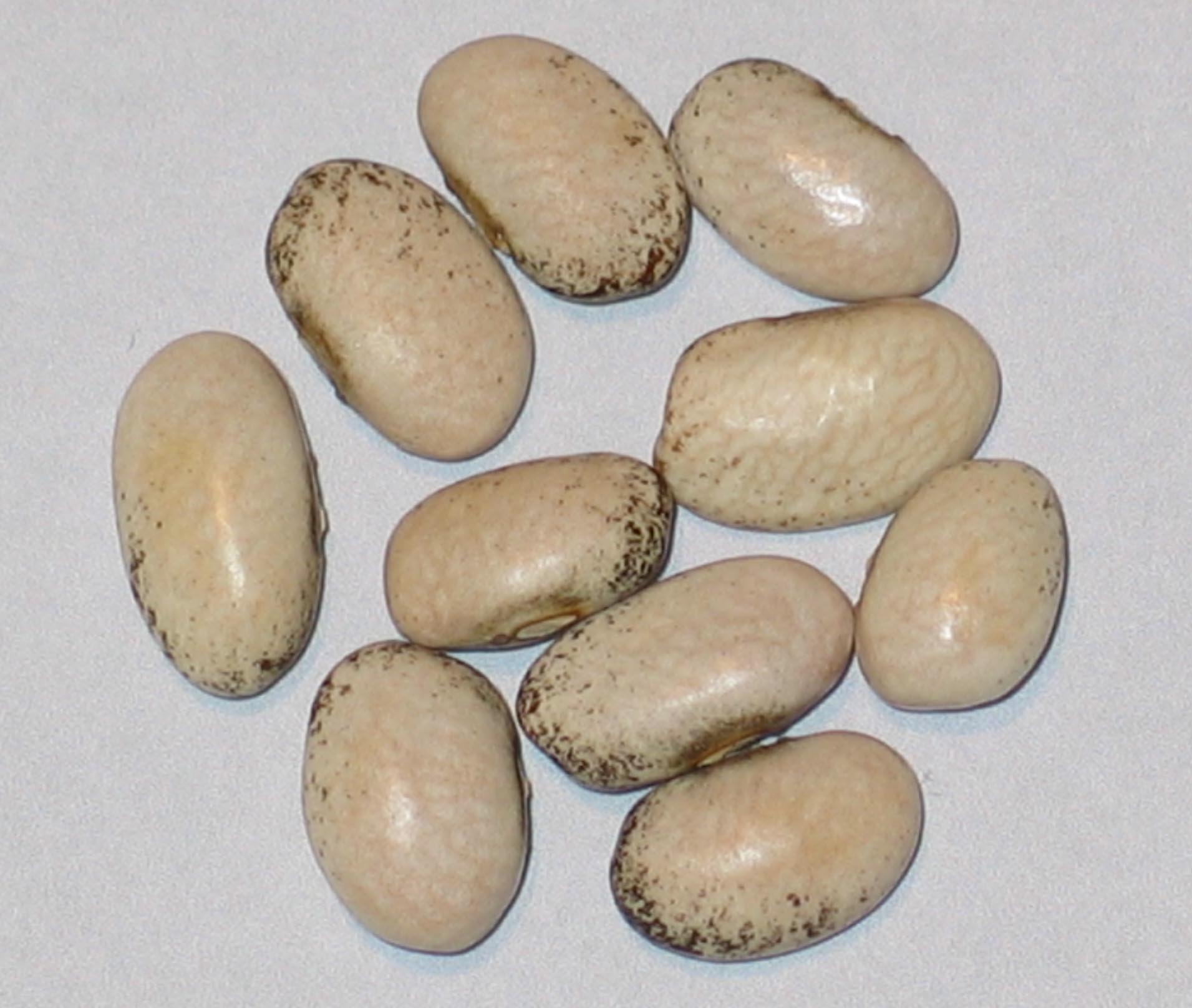
Nova Star
SOLD OUT
The Nova Star is a pole dry bean variety known for its productivity and was developed by Marshall Smyth, a bean enthusiast from Potter Valley, California. Discovered among his Mayflower beans in 2012, this bean showcases Smyth's passion for cultivation and selection, contributing to a unique addition to the world of dry beans.
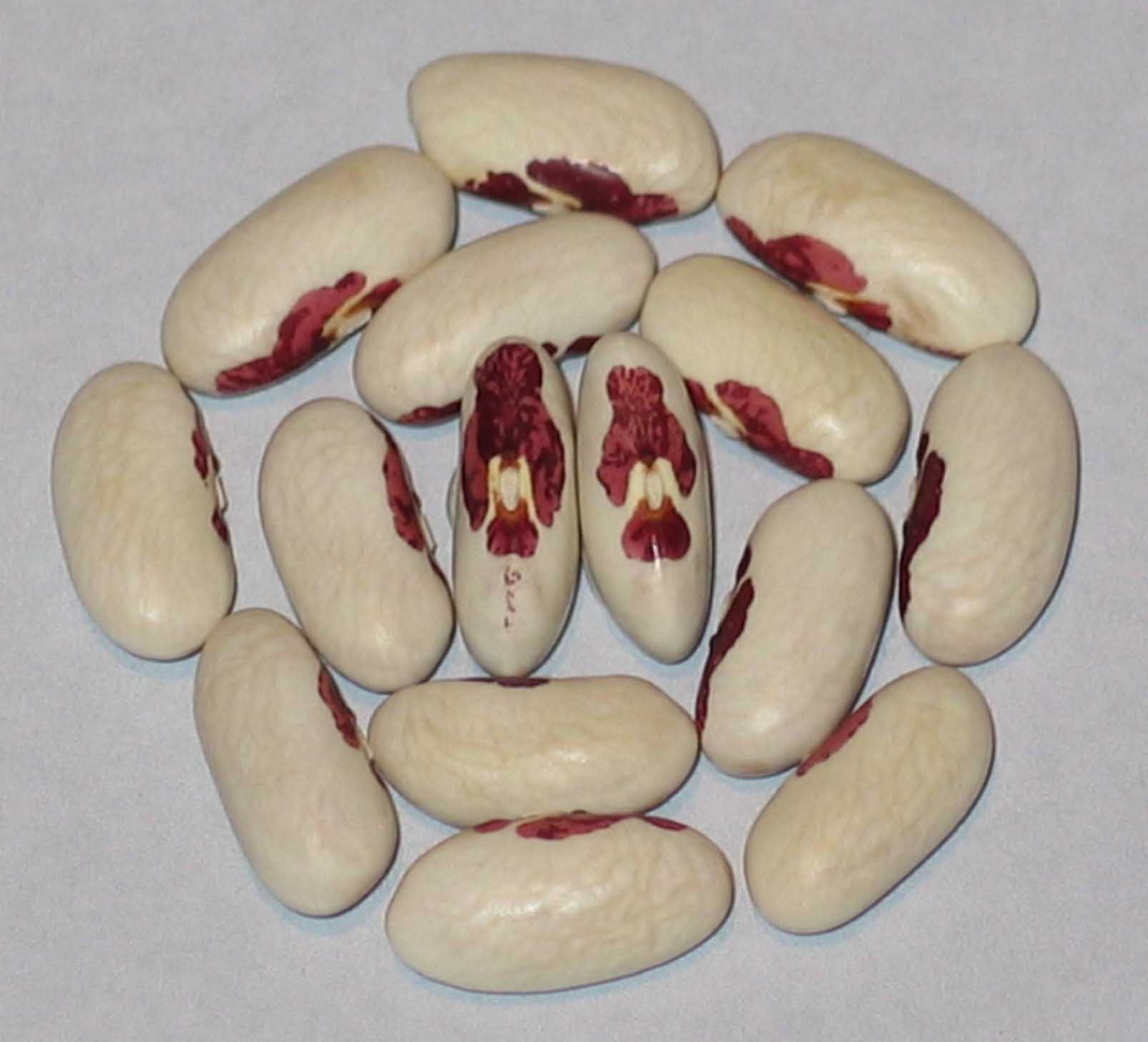
Nun's Belly Button
Packet Size 25 Seeds $5.00
The Nun's Bellybutton is a bush dry bean that matures to its first dry seeds in about 90 days. Characterized by upright plants without runners, it resembles a soldier bean in appearance. This unique variety was sourced from the private collection of an employee from Garden Organic (formerly the Henry Doubleday Research Association) in the UK, and was imported in 2012 due to its intriguing name.
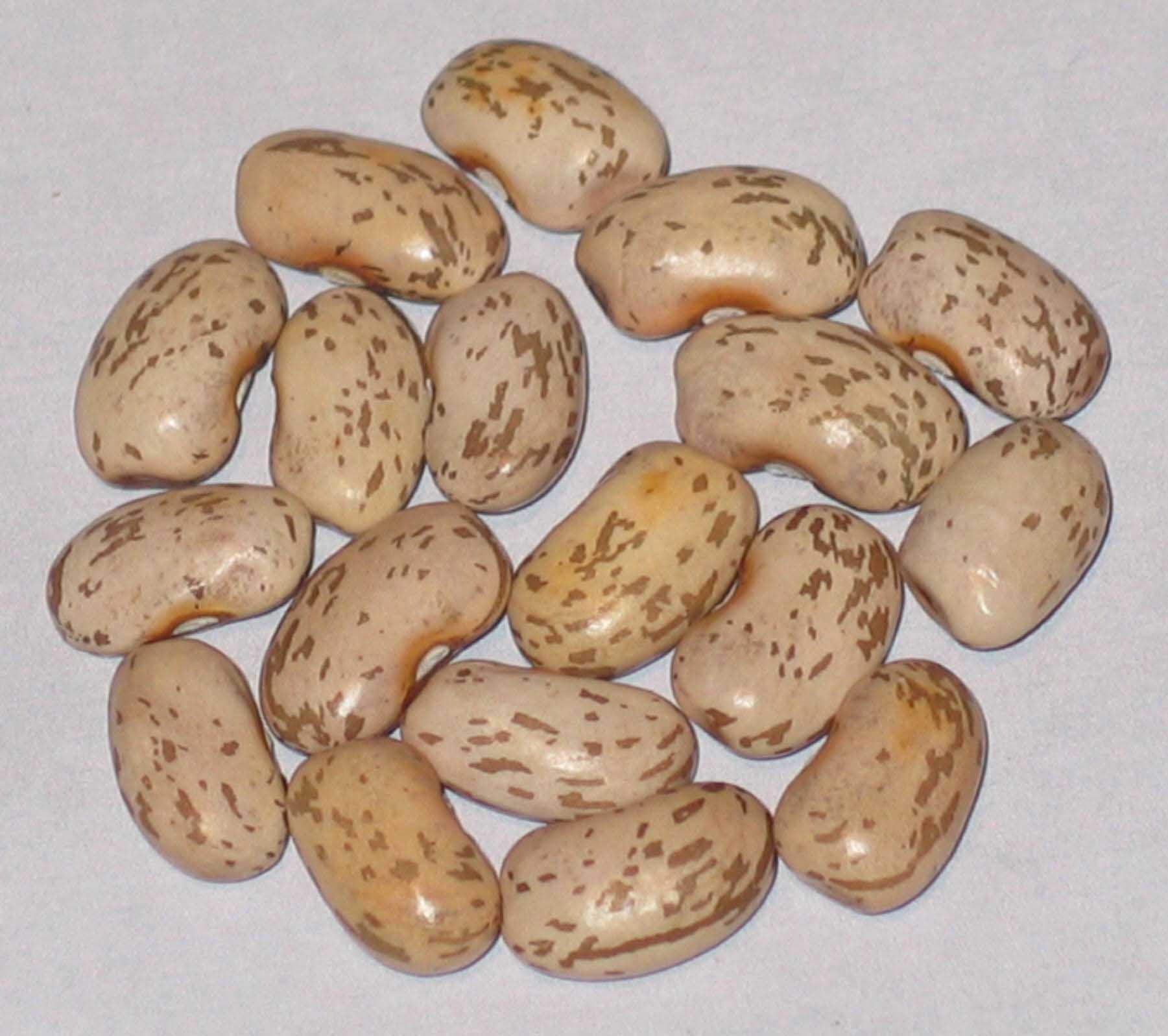
Oak Tree Pinto
Packet Size 25 Seeds $5.00
The Oak Tree Pinto is a bush dry bean variety known for its distinct pinto markings and color. It reaches maturity in approximately 90 days to yield it's dry pods. This variety is one of the original beans named by the late Robert Lobitz from Paynesville, Minnesota, reflecting his dedication to developing unique bean cultivars.
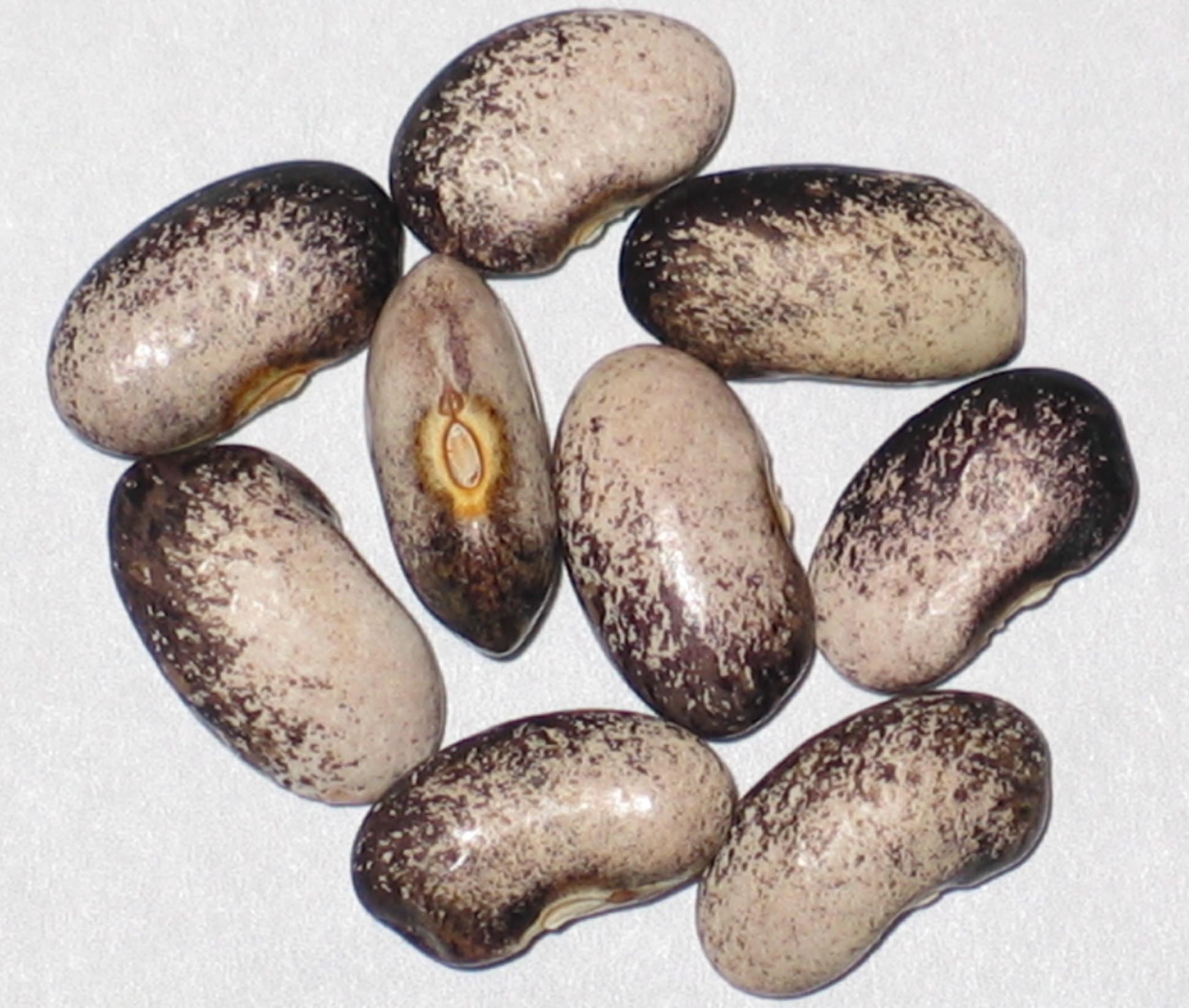
Ohio Pole
Packet Size 25 Seeds $5.00
Pole Dry. Ohio Pole is a historic heirloom bean that dates back to the late 1700s and was cultivated by the Miami people of Kekionga (modern-day Fort Wayne, Indiana), along with the Potawatomi, Shawnee, and Delaware tribes. This prolific variety produces fleshy 8-inch pods and can easily climb over an 8-foot trellis, necessitating strong support due to the heavy, mature vines laden with pods. Additionally, its seeds are visually striking, making this bean not only a productive choice for growers but also an aesthetically appealing addition to any garden.

Orca
Packet Size 25 Seeds $5.00
The Orca, also known as Calypso or Yin Yang, is an heirloom bush dry bean variety that takes over 90 days to mature to dry seed. Growing upright to about 17 inches tall without runners, these productive plants showcase a distinctive black and white pattern. Believed to have originated in the Americas, specifically the Caribbean, the Orca bean is not only a striking addition to gardens but also a reliable producer.
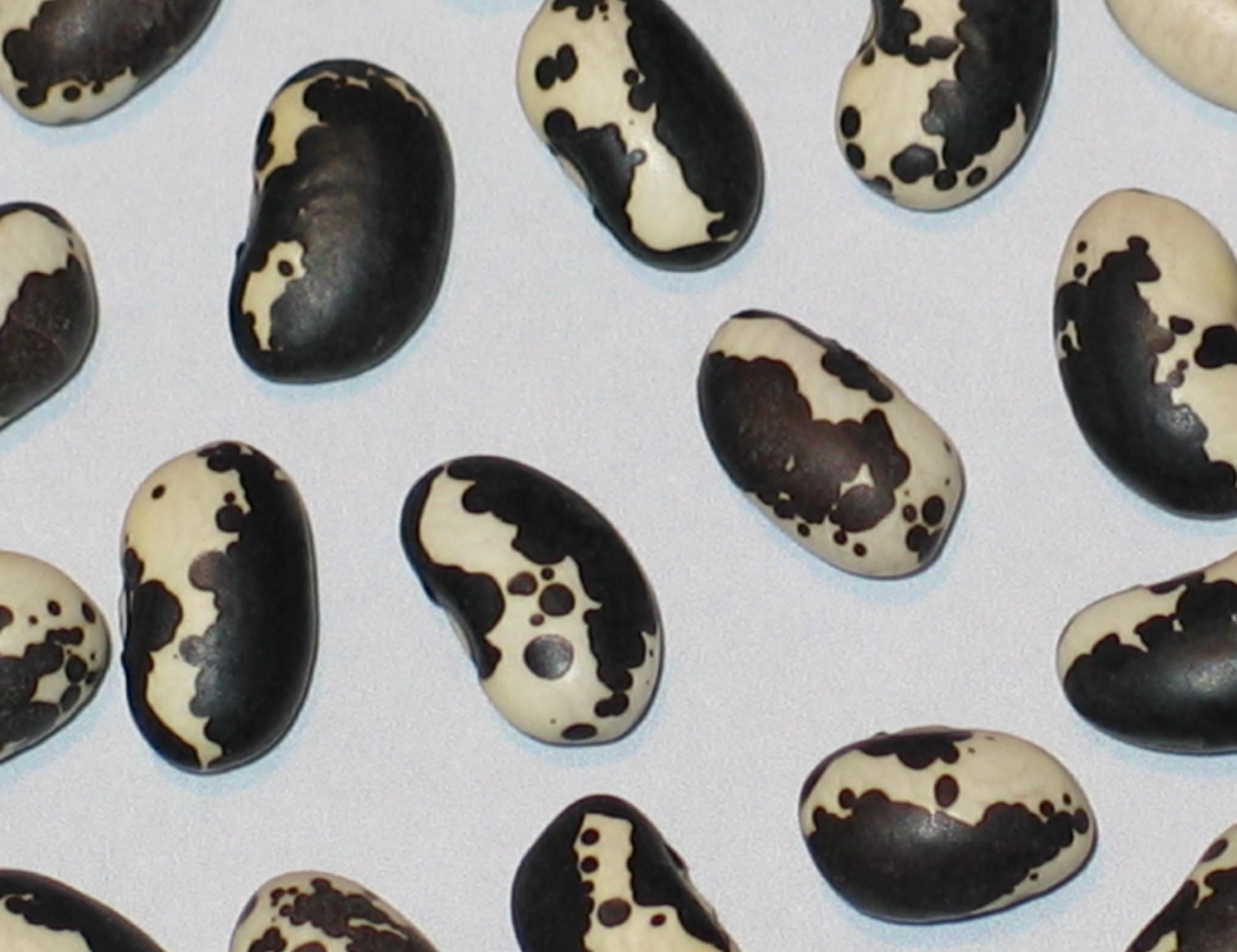
Orca ( Double Helix Strain )
Packet Size 35 Seeds $5.00
Semi-Runner/Dry. Another bean by the name of Orca. The grower is the Double Helix farm in Conway, Arkansas who had received it from Canadian resident the late Dan McMurray. Dan was a customer and friend of the Double Helix Farm. This seed is different from the bean that I have come to know as Orca which has the large blotch of black on a rounder seed surrounding the eye against a white background.
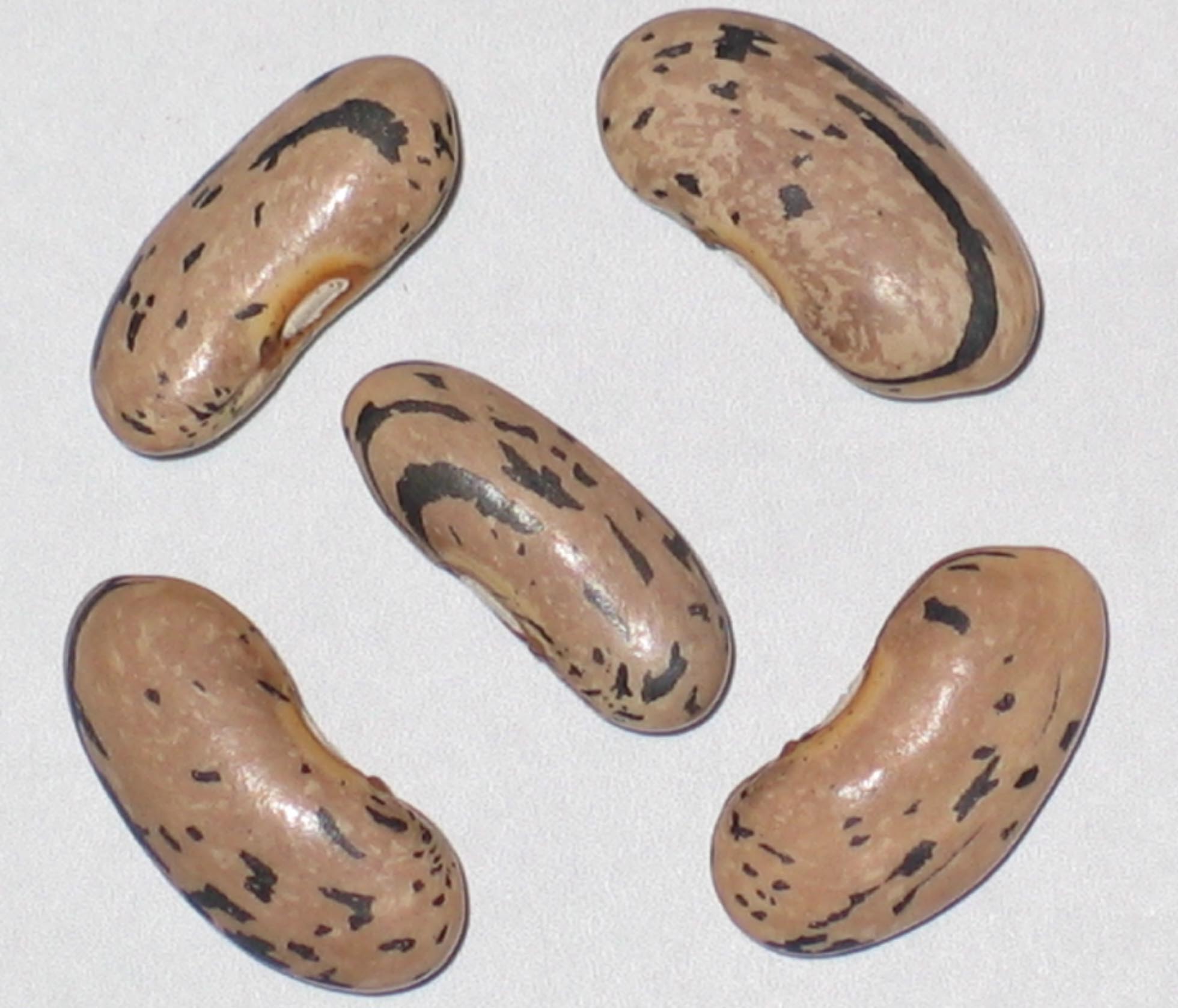
Oregon Giant
Sold Out
The Oregon Giant is a pole snap bean variety known for its vigorous climbing habit and impressive pod length, ranging from 8 1/2 to 9 1/2 inches, often marked with a brownish-purple hue. Each pod typically contains 7 to 8 seeds and features attractive pink blossoms. Originating from the western U.S., this variety has been a long-time favorite in the Pacific Northwest, cherished for over a century and historically cultivated for the canning industry from the 1930s to the 1970s. Its robust growth and high yields make it a reliable choice for gardeners.
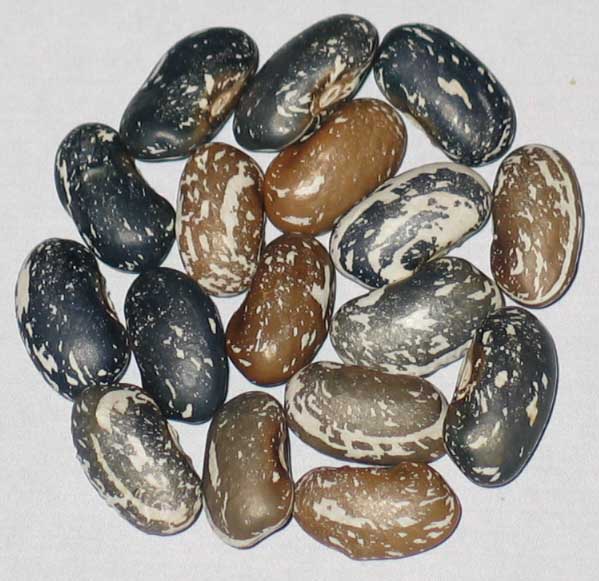
Osborne And Clyde
Packet Size 25 Seeds $5.00
The Osborne & Clyde is a pole/dry bean variety that takes over 90 days to produce dry seeds. These vigorous climbing plants are known for their heavy yields and feature green, short, flat pods adorned with reddish-purple mottling. The beans themselves come in shades of light gray with white, and occasionally light greenish-tan with white, potentially inspiring the playful name "Osborne and Clyde." This variety has a rich history, having been traded among Seed Savers Exchange members for nearly 50 years.
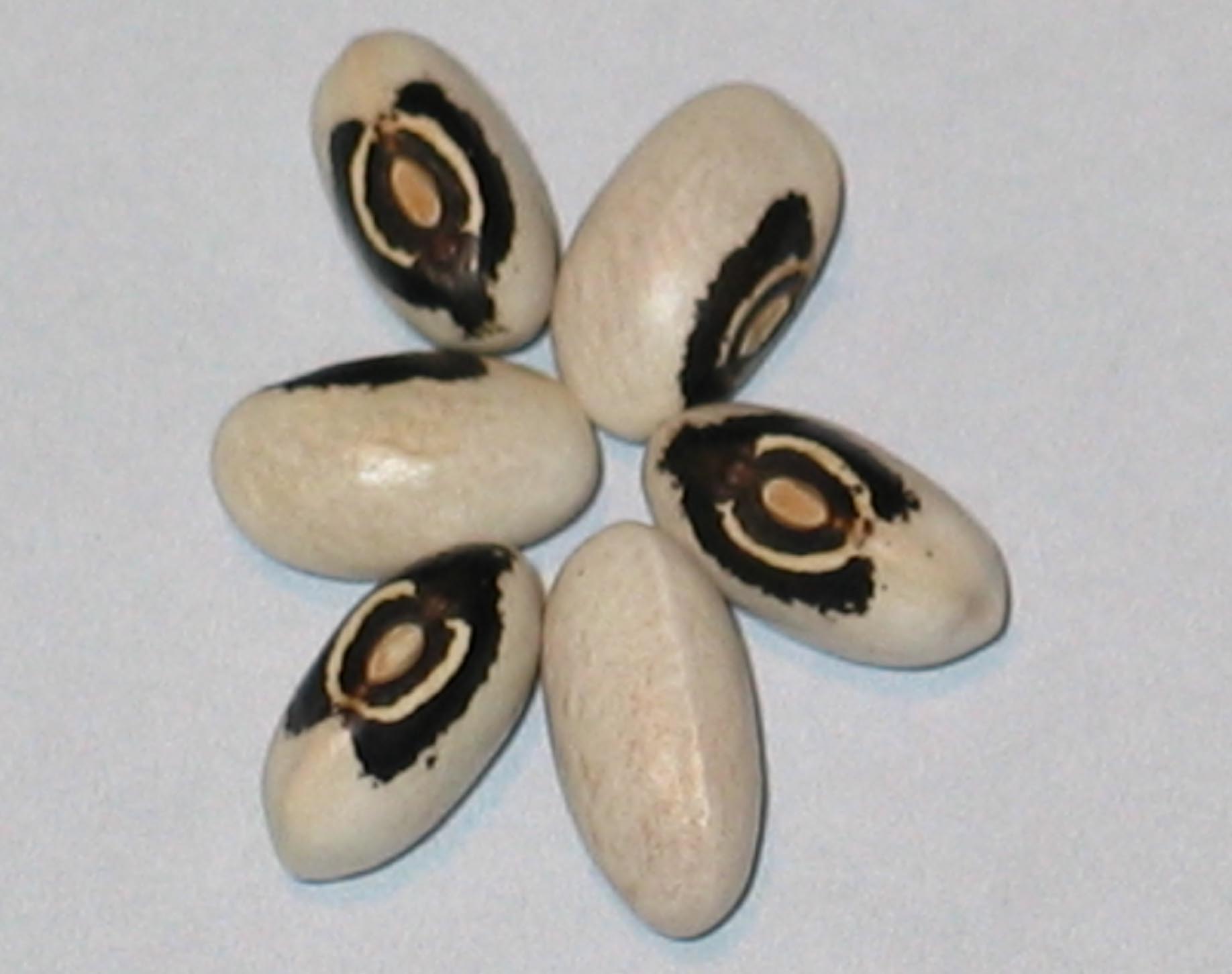
Owl's Head
Packet Size 30 Seeds $5.00
Owl's Head is a semi-runner dry bean variety known for its strikingly unique seed appearance, attributed to its origins as an outcross from Will Bonsall, a member of the Seed Savers Exchange in Industry, Maine. Originally grown in the early 1980s, this bean has displayed some instability, occasionally producing diverse seed coat patterns. However, recent cultivations suggest a trend toward a more true-breeding type, enhancing its potential for reliable traits while still captivating bean enthusiasts with its one-of-a-kind look.
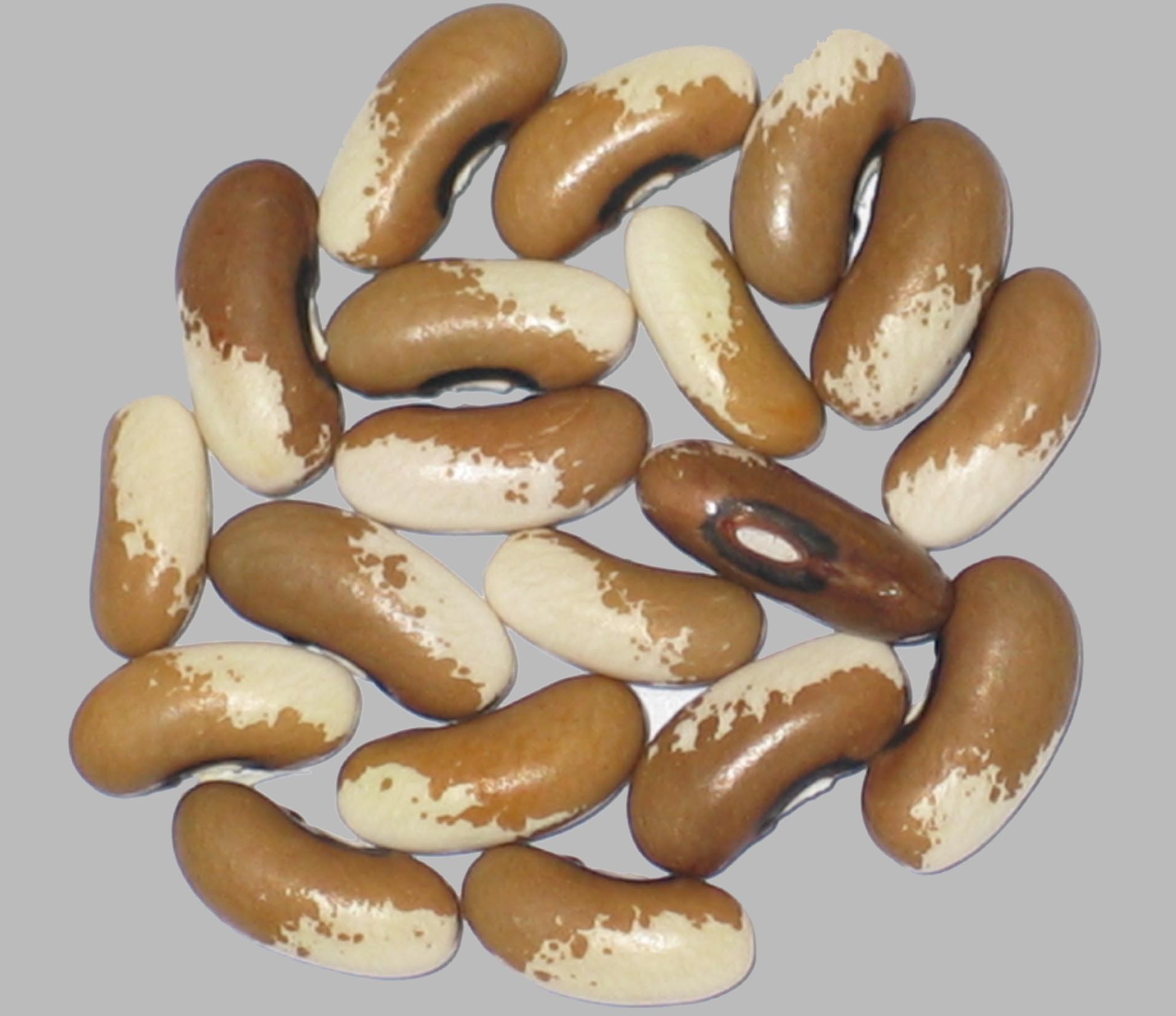
Painted Pony
Packet Size 35 Seeds $5.00
The Painted Poney is a bush dry snap bean variety characterized by its white blossoms and a growing period of about 60 days for snap consumption and 90 days for dry bean pods. Native to Mexico and the Southwestern United States, this compact plant produces long, slender green pods measuring 6 to 7 inches, typically containing 4 to 6 seeds each. For the best flavor, it's recommended to harvest the pods while they are still young and green, before significant seed development occurs, making them a delightful choice for both snap and dry bean enthusiasts.
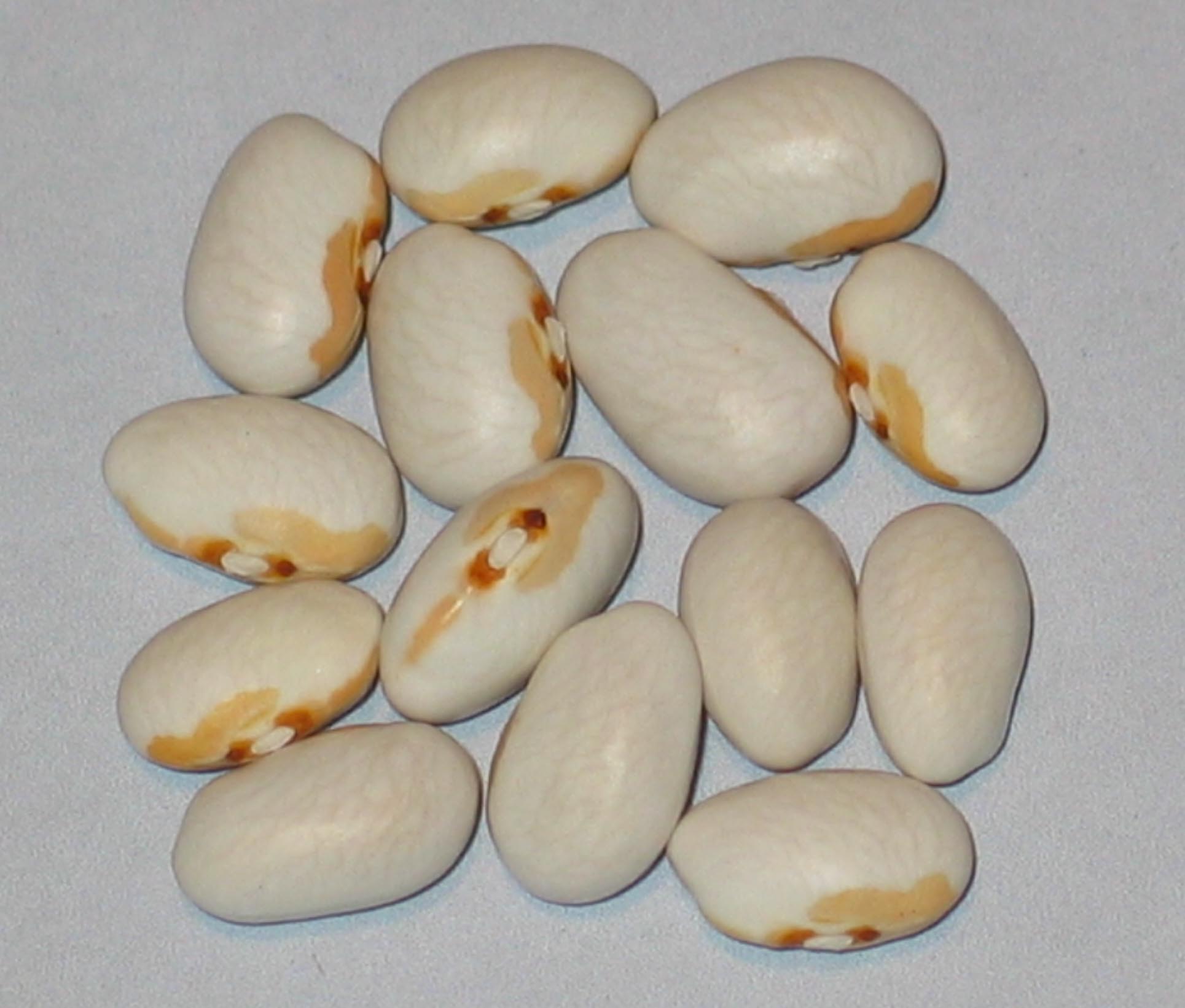
Pale Face
Packet Size 25 Seeds $5.00
Pale Face is a bush dry bean variety that matures in approximately 85 days, featuring upright, 18-inch tall plants that do not require runners. It produces oval green pods measuring 5 x Ĺ inches, yielding plump, white seeds with a distinct light flesh-toned figure around the eye that gradually darkens over time. Notably more productive than any yellow eye bean previously grown, Pale Face is easy to hand shell, making it an excellent choice for soups or baked beans. This varieties seed mother is Owl's Head. Discovered in my gardens and named by me in 1979.
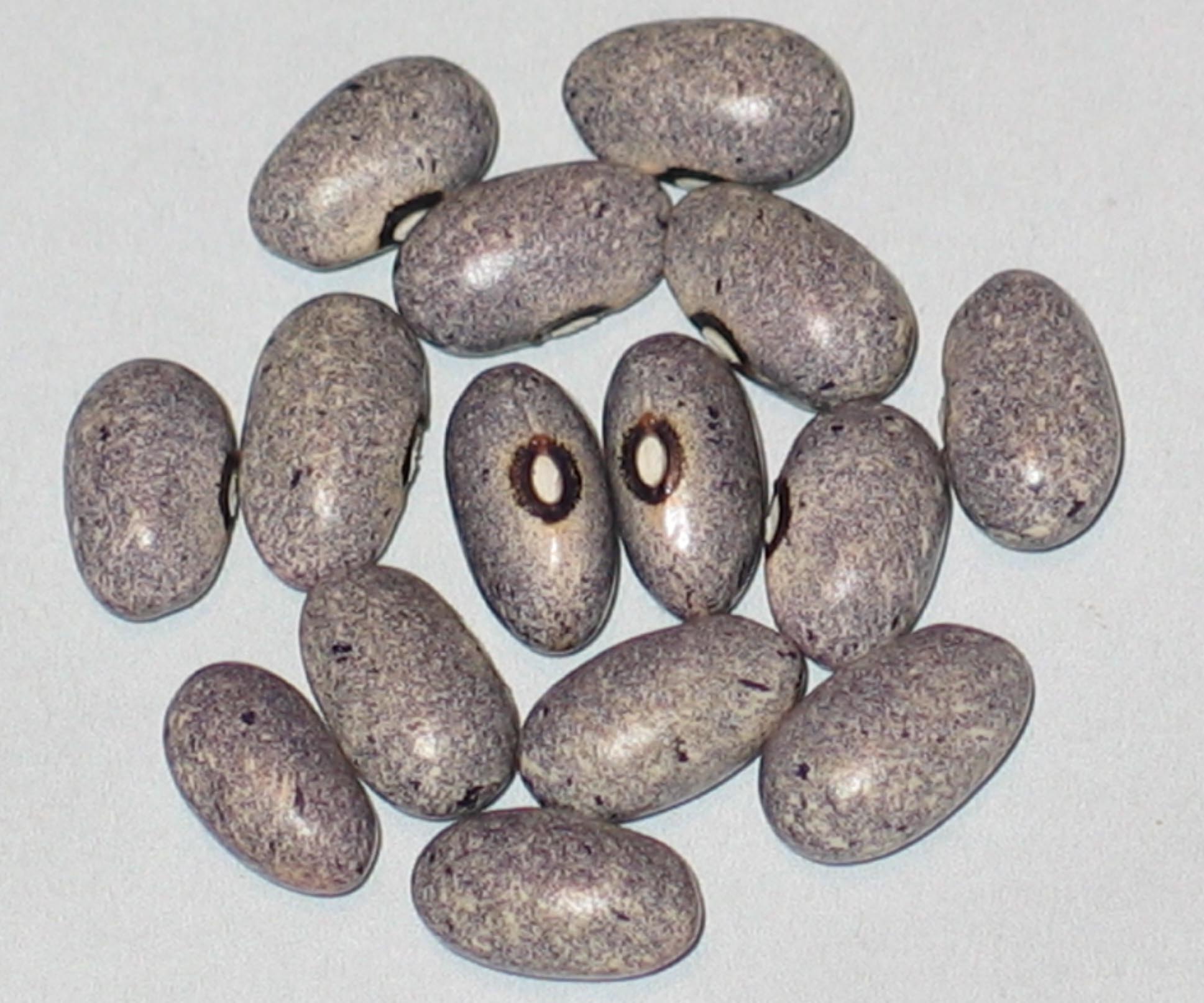
Pale Grey Lavender
SOLD OUT
Pale Grey Lavender is a semi-runner dry bean variety that takes over 90 days to produce its first dry pods. Known for its early production and striking appearance, this bean thrives when supported on a low 4-foot tall trellis, which keeps the drying pods elevated off the soil for better quality. Originating from Croatia, this European variety features a heavy pod set, and the seeds possess a visual appeal that surpasses their photographic representation, making them a beautiful and productive addition to any garden.
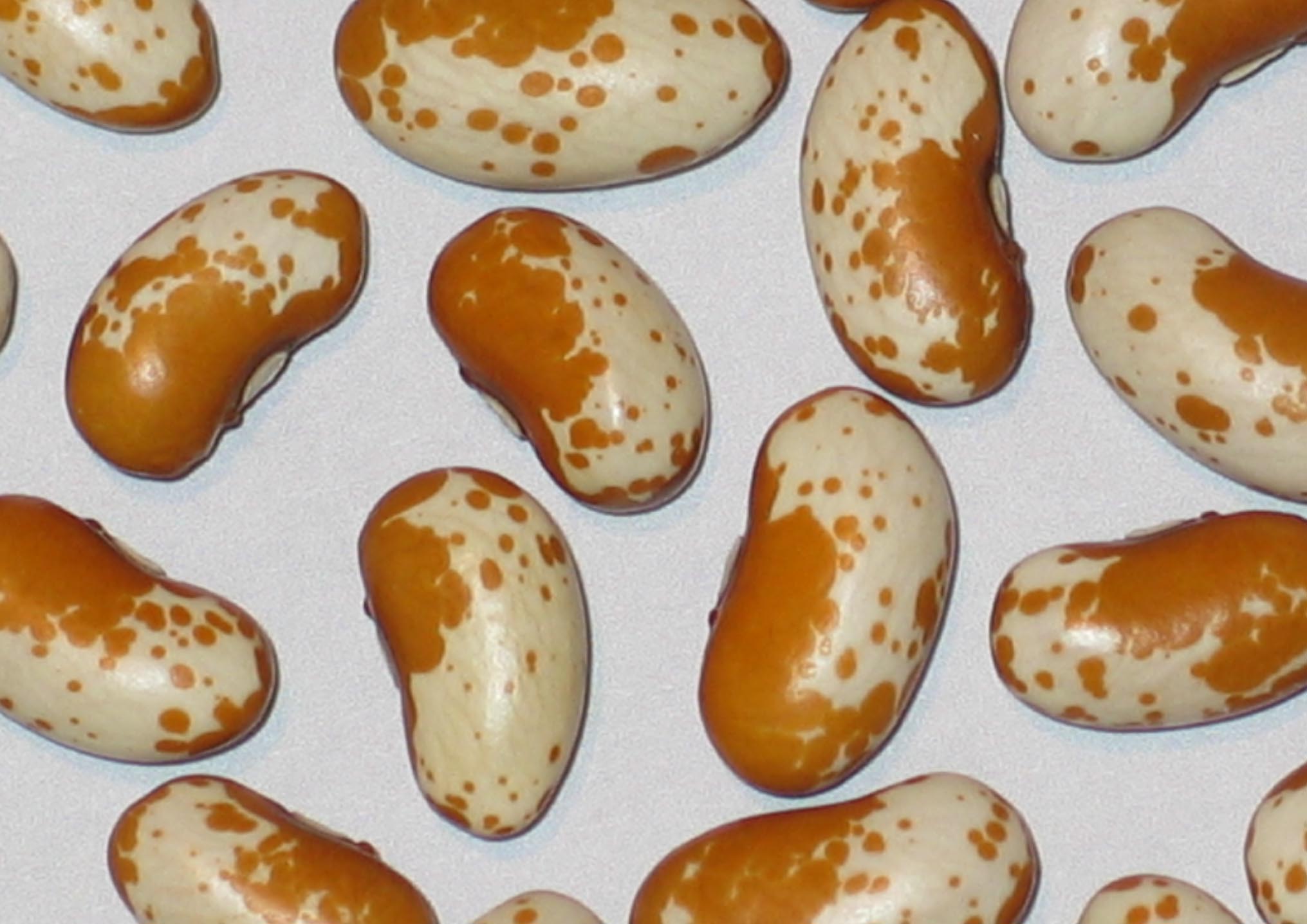
Palomino
Packet Size 25 Seeds $5.00
Palomino is a bush dry bean variety that typically takes over 90 days to yield its first dry pods. Characterized by its green oval pods, this variety was once a part of John Withee's Wanigan bean network and comes with a mysterious and obscure history that may remain untold. Despite its enigmatic background, Palomino offers a unique addition to the garden, embodying a legacy of heirloom beans with possibly an intriguing story waiting to be discovered.
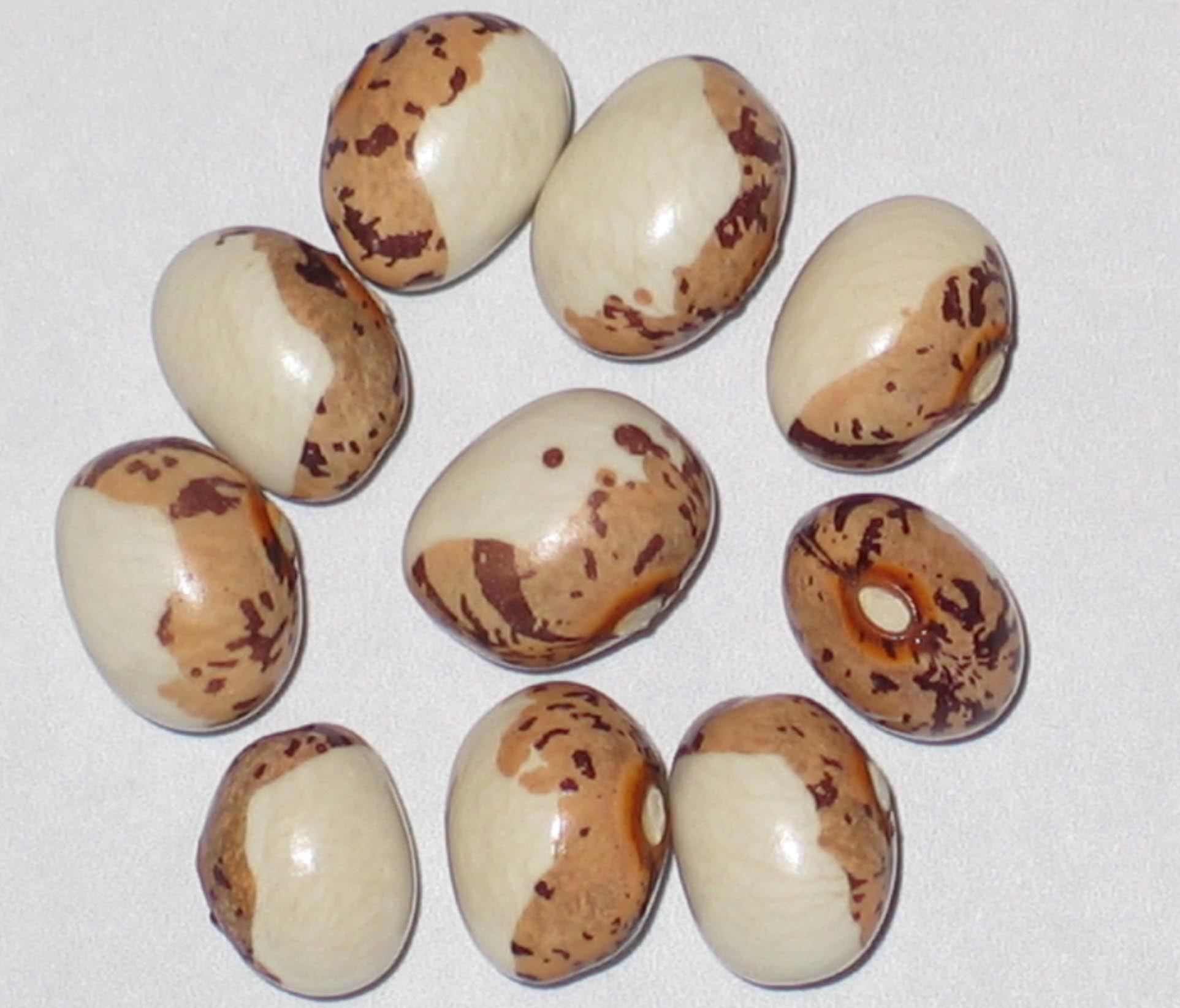
Papa de Rolla
Packet Size 20 Seeds $5.00
Papa De Rolla, also referred to as Dove's Breast beans, is a pole dry bean variety that takes over 90 days to produce dry seeds. Believed to have originated in Portugal and now cultivated in the USA, these heirloom beans are recognized for their distinctive speckled appearance. With a rounded half white seed and a large eye patch that features tan, burgundy, and cream shades of coloring. With a mild flavor, they are versatile ingredients suitable for a range of dishes, including hearty soups and stews, making them a delightful addition to any garden or kitchen.
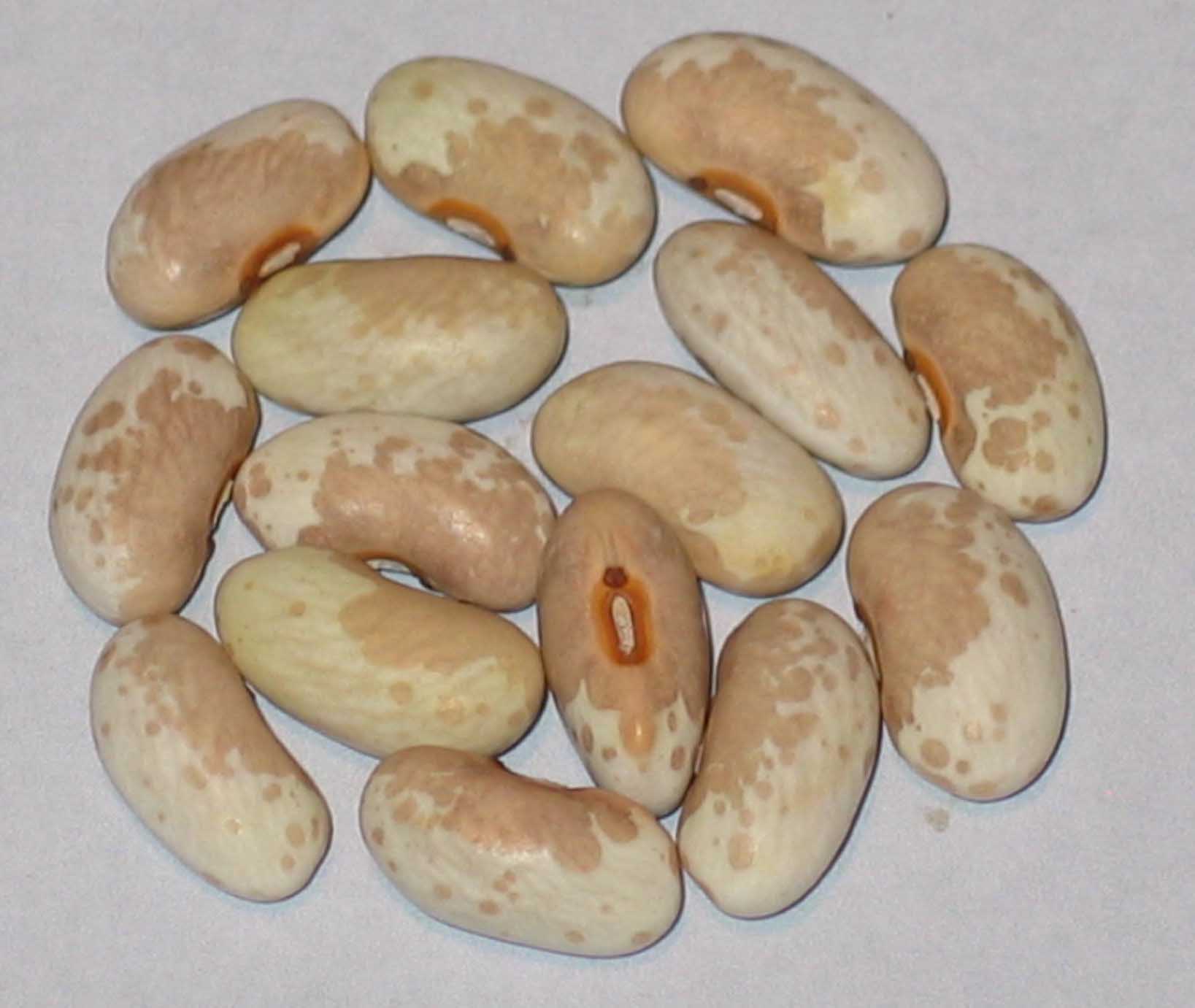
Parkerís Prairie
Packet Size 25 Seeds $5.00
Parker's Prairie is a bush dry bean variety that produces its first dry pods in approximately 85 days, with the remaining pods completing the drying process over the next three weeks. The seeds are nearly white at harvest, with their distinctive color and markings developing gradually over several months. This unique variety began it's development in 2015 in my garden from genetic material obtained from former Seed Savers Exchange member Ron Thuma of Hartford, Kansas, who in turn obtain seed material that Robert Lobitz left behind after his passing in 2006. I christened the bean with this name in 2020,
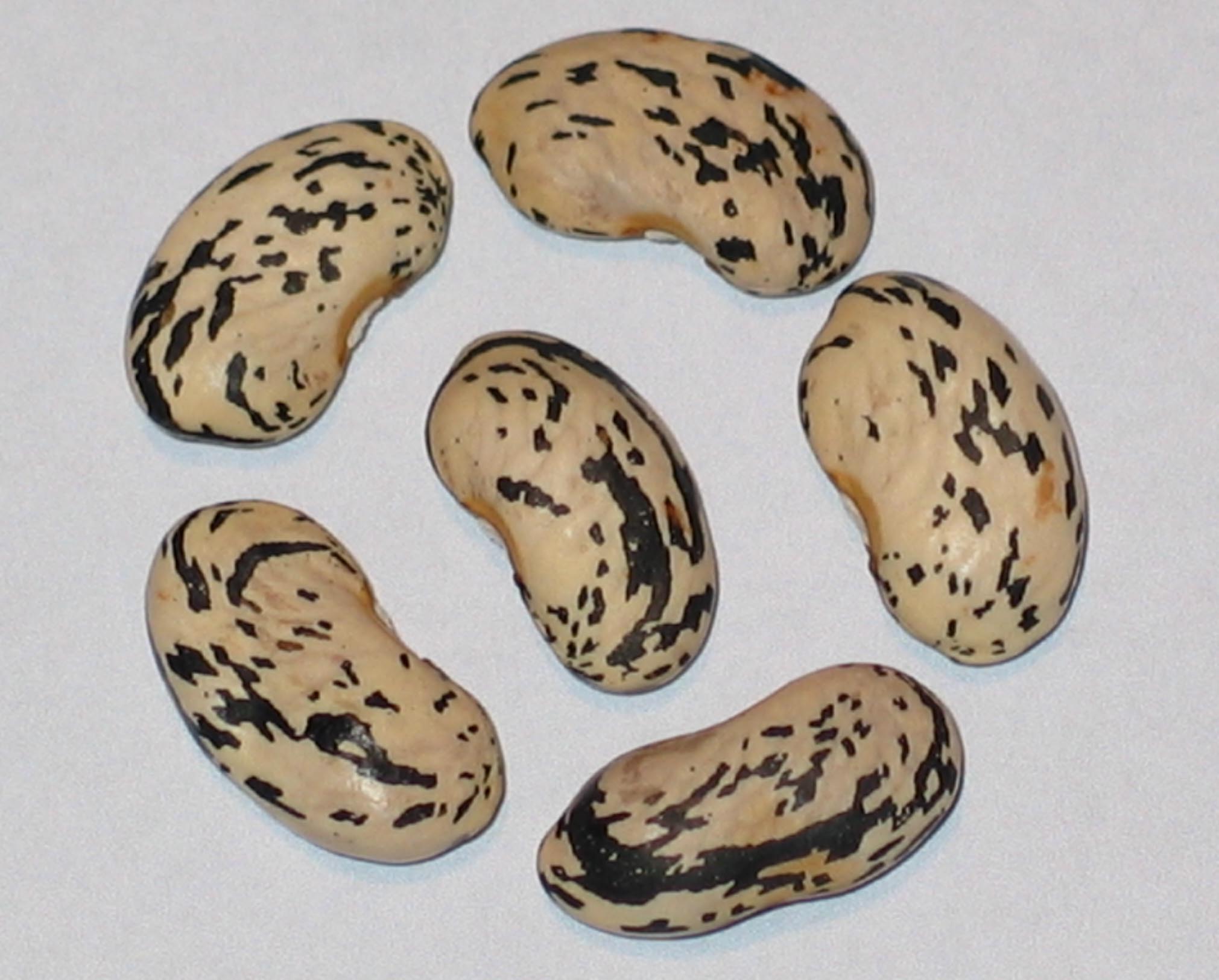
Paul Bunyan Giant
Packet Size 25 Seeds $5.00
Paul Bunyan Giant is a pole snap bean characterized by its impressive long, 8-inch flattened green pods adorned with striking purple striping. Acquired in 2011 from the Central Tree Crops Research Trust in New Zealand, this bean has an obscure and largely unknown history. It's important to note that it should not be confused with the Oregon Giant, as these two bean varieties are distinct from each other.
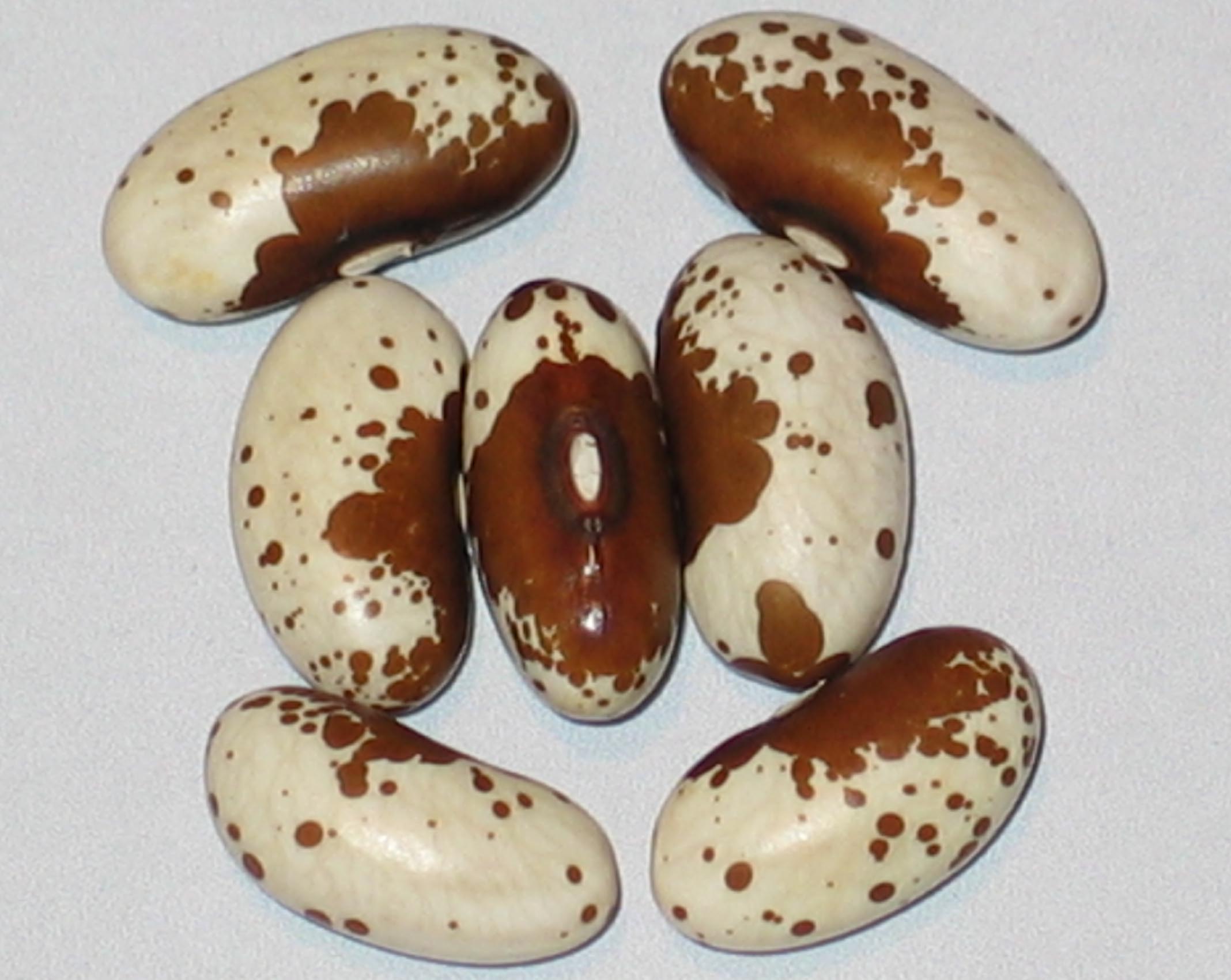
Pawnee
Packet Size 25 Seeds $5.00
Pawnee is a bush dry bean variety that matures in approximately 90 days, yielding clean shelling dry pods from upright plants without runners. Discovered and named by me in 1979, its seed mother is an all-brown seeded variety called Brown Kidney. Pawnee was first documented in the Seed Savers Exchange yearbooks of 1982 and 1983 and has since been commercially available through a heritage seed company in Canada, gaining popularity among bean enthusiasts in Europe as well.